#like even just as the typical friends turned rivals narrative there's no way there's not digs at paul in there
Explore tagged Tumblr posts
Text



crippled inside & my brave face

#these two songs have absolutely nothing to do w each other btw#I Do however think they were still constantly inspiring each other w their solo discogs including lyrics/riffs/etc#I do also think crippled inside is so obviously about paul#like even just as the typical friends turned rivals narrative there's no way there's not digs at paul in there#so I think if he took the digs at him and turned them around and like#admitted to one and said he's trying to overcome the other well that's very :(#paulbrecito etc
12 notes
·
View notes
Text
one of the things that i loved best about When The Phone Rings was the way that it skewed the typical narrative of rival/enemy female characters in a story like this. with You Ri and In A, we were introduced to two other women who could easily have been rivals or enemies with Hee Joo in various ways, but they both subverted expectations and standard tropes to be solid, likable, and deeper characters.
You Ri was seemingly set up as a cool, pretty, popular girl who had a crush on Sa Eon and could be some kind of love rival for Hee Joo, but it became clear pretty quickly that she both genuinely liked and cared about Hee Joo, her crush on Sa Eon was very superficial because she knew he was already married and had no intention of trying to steal him from his wife even long before she knew his wife was Hee Joo, and her building relationship with Sang Woo and her work with him on the orphanage story were clearly higher priorities for her. she was excited any time she heard from Sa Eon, but more because she was his fan than because she thought she had a shot with him romantically. i was surprised by how much i ended up loving her.
In A was also introduced as a menacing, intimidating presence at first; between the looming history between her and Hee Joo, the way Hee Joo's mother caused her muteness because of In A's hearing loss when they were kids, the fact that she was involved somehow in the marriage switch, and the implication that her return would potentially end Hee Joo and Sa Eon's marriage, she entered the storyline as a threat but then turned out to be genuinely trying to have a good, loving, sisterly relationship with Hee Joo. she was there to try to fix things, and she was adamant in her support and affection for Hee Joo. she wasn't trying to contact Hee Joo to manipulate or hurt her, but because she actually wanted to recover the chance to have a sister she could take care of and protect. everything she does is in this vein, even taking her own father to task for his behavior and mistakes. she was dedicated.
there was just so much to love about this show, the characters were all so well realised and everyone did such a good job with all of it. women not fighting with women was great, ladies just supporting each other instead and being friends and sisters. A+.
132 notes
·
View notes
Text
Round 3


Propaganda Under Cut
Kairi
kairi is the third protagonist of the kingdom hearts series and the third member of the destiny trio, alongside fan favorites sora and riku. sora/riku shippers HATE kairi, and will go out of their way to discount her at every turn. the hate for her ranges from typical "she's a boring bitch" to fans of soriku making five-hour long video essays reassuring their fellow shippers that the big bad kairi won't show up in the next installment – to quote one video, "she's in a box. she's on the shelf. four walls, no door." kairi is the greatest bogeyman the soriku fandom has ever known, to the point where most of said video essays and fanon meta posts focus not on why sora and riku should get together, but rather on why they don't like kairi.
Literally has a 100+ page Google doc fan theory writing her out of the narrative and putting all of her (few) canonical accomplishments onto half of the popular m/m ship (soriku). Don't even get me started on how her memory was completely written out of the canon plot of re:coded. KH is a nightmare to explain so dude trust me she is THE victim of yaoi
She is so fundamental to the plot and themes and narratives of game and yet it is near impossible to find anything about her thats not ship bashing pre-mlm with the other two characters. I dont even care if she ends up with one of the main characters i just want fans to see her as a cool character to love or like, anything other than “annoying comphet girl.” You can write your mlm but pleaae stop inventing comphet where it doesnt exist. She does not even get to spend time with sora ever?? Why does everyone see her as a threat and a thing to destroy?? Let her have friends so help me
Misa Amane
she gets treated in-canon the way fandoms treat female characters that Threaten an m/m ship. it's like, "oh why don't you go sit in the corner and be pretty, misa, while the Men have intelligent conversation and pretend they aren't ten seconds from fucking each other, doesn't that sound nice?" it's infuriating. and MAYBE it's better now but i remember her getting treated the same way in fanfiction too, like we all need to do just as badly by our female secondary characters as fucking tsugumi ohba, but with the added insult of making her be alternately oblivious of the relationship between light and L or actively trying to sabotage it—incompetently, of course, because god forbid misa be allowed dignity or moments of cleverness.
she's one of the first characters I think of when I consider old school fandom misogyny. The annoying bitch and clingy crazy gf allegations were AFTER HER ASS. She's also a lot more intelligent than people gave her credit for, but most seem inclined to take the Very Biased word of our unreliable, narcissistic narrator and his homoerotic arch nemesis and claim that just because she's bubbly and into romance that she's also a complete moron. Which is blatantly untrue. Everyone was afraid of Misa girlbossing too hard. Killing people and devoting yourself to the deranged twink of your dreams even though you know he'll never love you back??? Having a hardcore goth aesthetic and being so Hot even literal Death Gods are into you?? God forbid women do ANYTHING!
Not only is she the victim of yaoi culture, she is the victim of early 2000s misogyny by an author that wanted to introduce a girl character because he knew his male rivals were getting too homoerotic. She is a goth bimbo icon who portrays what I think is one of the few callouts for stan culture and what parasocial relationships can do to both the stan and the idol. The fact that she is a toxic fan of Kira and also hot, funny, sociable is tragic in its own way, which I think the author did try to touch on but was too misogynistic too really get through. Of course, she was reduced to villain status by the fandom and anime alike because she got in the way of the supposed romance in their psychological horror anime.
296 notes
·
View notes
Note
Thank you for fixing the asks! Anyway 💎 🍭🔔🏳️ for the writing ask game if thode aren't too many!
Thank you for pointing that out! Because I would never notice myself, even though this exact thing has happened before. Head in hands.
So!
💎 - What’s a WIP idea you’ve really enjoyed writing?
Several!
"Everything Moves" is definitely the work I've had the most fun writing as of late. It went in a completely different direction than I originally planned for it (I actually wanted to skip the entire performance part - imagine that! I'm really glad I didn't!) After I decided to write the performance anyway, even though I wasn't confident about it at all, my mind took than as an opportunity to nerd out about classical music and I was just! So! Happy! To put in all those little musical details! I genuinely hold it very close to my heart because of how much I could just talk about something I genuinely really love, and have it fit the narrative pretty well too. While difficult technically, I enjoyed every moment of writing it, including studying the concerto and its structure!
"Fire with Fire" is another one. It's just so... Cathartic to me in so many ways. Most importantly in the "don't think, just write" one - I think that day I just realized if I couldn't get myself to write, then I'll probably never start writing again. I still like how it turned out despite the flaws.
Also, "Hollow Bones". This is a bit of an older one, but I think it still holds up pretty well, even though I typically get incredibly self-critical about everything I write in like... a week I finish it. I was going into surgery and literally wrote a giant chunk of it in the waiting room to take the stress off. Another one of "just write" moments for me - somehow I always feel like anything I write in that mindset turns out pretty well.
"lingering" is also an older one, but I really liked working on a gift like that. Picking every word with the intention of "oh, I'm gonna break her heart with this, she's gonna love it" was very exciting.
🍭 - Favorite things to write about
Friendly rivalries! I really like a good set of rivals that have good sportsmanship and push each other even further. I don't think it shows up much in my writing before I haven't actually posted that much, but my OCs have that trope a lot.
Also, narrative parallels. Character foils, similar situations that turn out differently because of characters' different reactions, all that. So hard to write but so satisfying to see the reaction.
Music!
Also misunderstandings and close proximity tropes, because I am weak.
🔔 - What compliment meant the most to you regarding your writing? (offline or online)
I'm actually so overwhelmed with positive response right now! Definitely in a good way, but also, woah. Thank you all so much! I'll definitely get back at all your comments when I find the right words. I'm very grateful!
I think at the moment what hit me most is my violinist friend I mentioned a couple posts back saying this. (And also many more nice words that I'll not mention for the sake of privacy)

I was fully prepared to face criticism even though I don't really handle it well, but his comments were so positive! I feel honoured.
Thanks again if you're reading this, friend!
🏳️ - Favorite way you have described something in your works
Hard to say! But this passage from "lingering" regarding An's character comes to mind:
"The fierce, raging fire has matured into something else; just as bright and warm, but calmer, steadier. A flame that won't go out easily or run out of air; a goal and a path ahead rather than a distant dream. Haruka wishes she was there to witness it."
I still like how it flows!
Thank you so much!! Sorry I went on a rant haha (• ▽ •;)
0 notes
Text
What The Hell Is Satanism? The Backstory, The Beliefs, And The A-To-Z On Devil Worshippers
4 days ago, Nike decided to sue a small indie art collective based in New York.
This isn’t news. This isn’t the first time a profit-mongering fashion-giant has targeted businesses trying to make a name for themselves. And it won’t be the last.
But this time, there’s probably something else influencing the executives reclining on their plush leather seats: they said it was because MSCHF stamped on the Nike Swoosh. But we all know what the real problem was:
These kicks were soaked with Satanic imagery - oh, and a single drop of human blood.
"MSCHF and its unauthorised Satan Shoes are likely to cause confusion and dilution and create an erroneous association between MSCHF's products and Nike”
Translation: no, we don’t want to be associated with devil worshippers.
Satan and his followers have once again hit the press following Lil Nas X’s latest viral YouTube hit and release of his custom footwear. And he does the belief system - and the LGBTQA+ community - justice.
But Satanism goes much deeper than pole dancing your way to hell.
It goes deeper than the fears of your evangelical aunt, it goes deeper than the rumours of a sacrificial ritual that happened in the woods outside of town, and it goes deeper than QAnon conspiracy theories.
Today we explore what Satanism really is. And what it really isn’t.
*twerks towards hell*

What Is Satanism?
Satanism is a group of modern religions that are centred around Satan, an entity in Abrahamic religions (e.g. Christianity and Judaism) that rebelled against God, has power over Hell and demons, and seduces humans into sin. Satan features in a vast number of major religions: he started off in Zoroastrianism, then making his way to Judaism, Islam, and Christianity. But the modern followers of Satanism are inspired by the Christian fallen angel and ruler of hell.
A large proportion of Satanists follow atheistic Satanism - they don’t necessarily believe in an entity but follow a philosophy that focuses on individualism and satisfying the ego, or rebel specifically against the dominance of Christianity in Western society.
Although Satan is typically considered the embodiment of evil, most strands of Satanism are not. However, there are some groups that fit this mould like the Order of the Nine Angles: they’re neo-Nazis.
The actual worship of Satanism only began just over 50 years ago, in 1966. But the use of the term ‘Satanist’ stretches back centuries further. Calling someone a ‘Satanist’ (or something to that effect) was an insult reserved for those that disagreed with a Christian group’s beliefs.
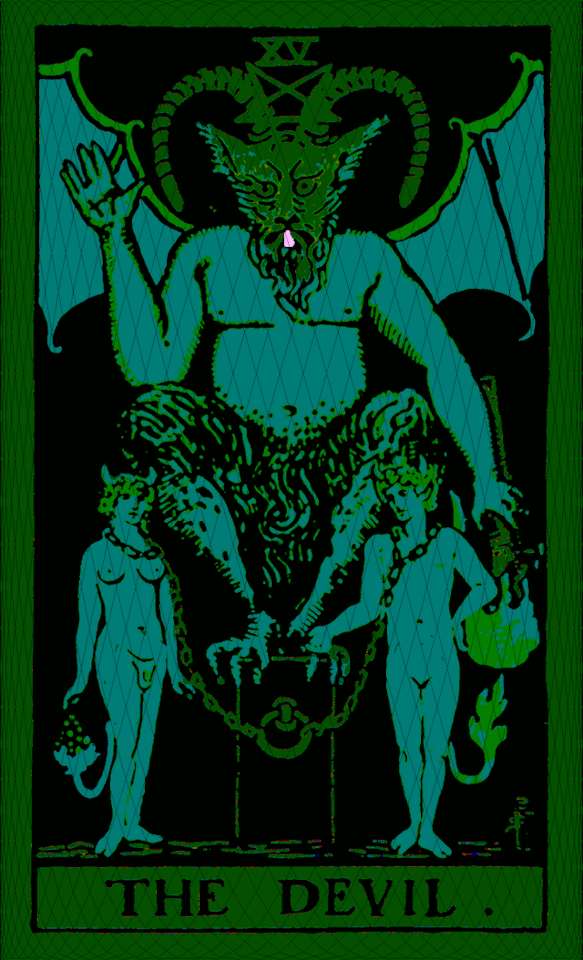
A Not-very-brief-but-look-I-tried-ok History Of Satanism
Here’s the thing about Satanism: at one point in history, every religious group was deemed Satanist.
You see, that’s how it all started.
Even the term ‘Satan’ originally meant ‘adversary’. It didn’t necessarily refer to a horned, evil ex-angel once scorned by the Almighty. It meant ‘other’; it was just an insult. It wasn’t created by groups of men draped in blood red robes preparing to slaughter a virgin to their ungodly master - Satanism was actually created by Christians.
The word ‘Satanism’ was first recorded in French and English literature back in the 16th century. Against the backdrop of the Reformation (when the Western Christian Church split off into Protestantism, Catholicism, and other more niche shards) rival religious groups would label each other with such terms frequently in various tracts and texts.
It was not to say that Protestants, for example, were actively worshipping Satan but were instead deviating from what Catholics thought was true Christianity. By ‘incorrectly’ serving God, they were supporting Satan’s claim to ruin the world with sin and evil.
*Disney villain laugh*
In the 19th century it broadened to encompass anyone that lived an immoral lifestyle and was thus serving Satan’s will. But in this same century it evolved yet again.
Yep, it’s time to introduce the actual Satanists: texts began to emerge that mention people that revered and worshipped Satan. It took a long 300 years for Satanists to reclaim their title. But the story doesn’t end here: this is a really important theme that runs like blood through the history of Satanism. Or, rather, the history of religious prejudice and persecution.
Throughout, well, all of human history, we have been swept up unto the belief that there is a dark, evil force lurking within our communities. The most recent example claims Joe Biden and his Democrat friends are Satan-worshipping baby-eating America-hating pedophiles. The fears of a discrete force that can hide at will fits the descriptors of the Judeo-Christian devil. And so, it had been applied to persecuted groups for centuries.
The Witch Trials and the Spanish Inquisition are the most famous examples of this. Satanism evolved in the Medieval era to scapegoat certain groups or to reinforce social norms by emphasising the apparently very real fight between good and evil.
Narratives of the French Revolution at the time were contorted with rumours of revolutionaries being part of a secret Satanic conspiracy. This revolution struck a blow to the power of the Catholic church, and some fingers pointed towards the dark lord of hell himself. Some even believed these revolutionaries had amassed supernatural powers to curse people and shape-shift into various creature ‘n’ critters like cats or fleas!
In the 20th century, another historical shift took place. And this time it (supposedly) happened from within the secret societies themselves: non-fiction authors and tabloids began to recount the allegations of people who once claimed to have been part of Satanic groups before converting to Christianity.
Doreen Irvine claimed she was given the ability to levitate amongst other witchy-powers. But Irvine’s claims sent shockwaves across the pond in the US. Much more horrific allegations were about to take centre stage. In the 1980s this would reach its climax with the Satanic Panic:
Also known as the Satanism Scare, the book Michelle Remembers (1980) detailed the alleged repressed memories of a psychiatrist’s patient which claimed they had been abused as a child for Satanic rituals. In these rituals, babies would be sacrificed and Satan would appear.
Reports of sexual child abuse for these rituals - known as Satanic Ritual Abuse - proliferated until the 1983 case made against the McMartin family. The McMartins owned a preschool in California and were allegedly sexually abusing the children in their care for ritualistic purposes. A lengthy trial ensued and the McMartins were eventually cleared of all charges.
But it was too late.
An evangelical anti-Satanism movement emerged claiming no children would lie about such claims and therefore all accused must be guilty. A conspiracy theory similar to those before emerged claiming SRA was rampant across the US, but it lost momentum by the turn of the 90s. Various investigations by the FBI and British government looked into SRA but found no evidence of Satanism or rituals in any cases of child abuse. Some lone cases of pedophiles did involve rituals, but these were isolated events that never involved Satanist groups.

The 7 Types Of Satanism
Satanism is an umbrella term to describe a vast array of religious groups. There’s a swirling sea of beliefs from the philosophical Satanists that don’t actually believe in Satan to the minority groups that are willing to sacrifice humans in the name of worshipping their god.
However, this ocean does share a common focus on individualism, self-perception, and non-conformity - traditional traits associated with the devil.
There are 3 forms of Satanism: reactive (attempts to invert Christianity and celebrates rebellion), rationalist (atheist and materialistic beliefs), and esoteric (actually worships Satan and draws upon religions like Paganism and western Esotericism).
The Church of Satan kick-started modern Satanism. Erected in 1966, Anton LaVey promoted an atheistic philosophy that focused on indulgence and an ‘eye for an eye’ ethical code that celebrated mankind as animals in an amoral world. Hate and aggression were not wrong but were advantageous for one’s survival. Yes, the seven deadly sins were actually beneficial for the individual.
The First Satanic Church was founded on Halloween night in 1999 by the daughter of Anton LaVey after his church was taken over by a new administration that Karla deemed against her father’s work.
The Satanic Temple is an atheist-activist group that stages political ‘pranks’ that rebel against the political and social dominance of Christianity. They aim to showcase religious hypocrisy in stunts such as performing a ‘Pink Mass’ over the grave of a Westboro Baptist Church goer (known for their explicit and offensive signs). They use Satan as a metaphor to rebel against a society that restricts personal autonomy and curiosity.
Luciferianism is a belief system that pivots around the characteristics associated with Lucifer. Followers believe Lucifer is the illuminated aspect of Satan, thus considering themselves Satanists. But some believe he is a more positive force than Satan. They follow the ancient myths of Egypt, Rome, and western Occultism. They consider him the true god - a destroyer but also a ‘light-bringer’ to the world.
The Temple of Set does not necessarily revere Satan by instead a being they call Set. Satan was the corrupted name of set, an entity that is the one true god. It gave humanity intellectual abilities to separate it from animals and they believe in a Setian philosophy with self-deification as the aim of all humanity.
The Order of the Nine Angles was inspired by ancient Pagan groups resident in Shropshire in the late 60s. But the founder of the group, Anton Long, is considered the pseudonym of neo-Nazi David Myatt. They encourage human sacrifice as a part of rituals and several members have joined the police and the military to do this without getting caught. The ONA is linked to several rapes, murders, cases of child abuse, and right-wing terrorism. They are also connected to several neo-nazi terror organisations.
The Joy Of Satan - contrary to its name - ain’t joyful. It’s an Occultist group that combines Satanism, Paganism, and UFO conspiracy theories. Just like the ONA, they’re Nazis. They believe Satan is one of many demonic deities which are powerful humanoid extraterrestrial beings which are equated with ancient gods. They believe Satan created humanity and brought us knowledge.
Reactivism isn’t a form of Satanism that is followed by an organised group but rather practiced on a personal, isolated level. It is considered an anti-social means of rebelling in a society dominated by Christianity. Most reactive Satanists are adolescents, mentally-disturbed, and have taken part in criminal activity associated with Satanic rituals they discovered through personal learning.
For example, in the 1970s two groups of teenagers in LA and Big Sur killed 3 people and ate parts of their corpses as a part of rituals devoted to Satan. Plotted murder and cannibalism are common traits of reactive Satanist crimes.
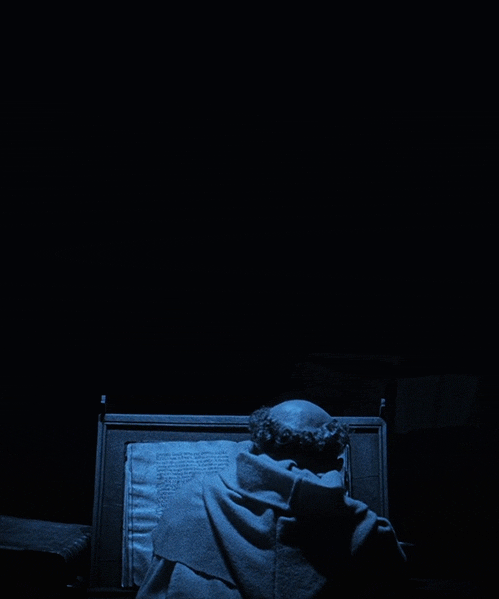
The A-To-Z Of Devil Worship
Baphomet
A deity that the Knights Templar allegedly worshipped. It is associated with the Sabbatic Goat which represents the equilibrium of opposites (half-man and half-goat, male and female, good and evil).
Black Mass
It is traditionally known as a requiem mass (funeral mass) in the Roman Catholic church from which the celebrants wear black clothes. However, it has been appropriated by Satanic cults. It often involves a naked woman as an altar and is the site of various Satanic magical rituals.
Cutter vs Wilkinson
A Supreme Court case which claimed federal funds cannot deny prisoners accommodations that are needed to engage in religious practices. Five residents of an Ohio prison including a member of a white supremacist Christian church, a Wiccan, and a Satanist filed the suit, claiming the officials failed to accommodate their ‘nonmainstream’ religions.
Devil
The personification of evil which shows up in many different religions. It is Satan in Abrahamic texts.
Demon
A supernatural entity often associated with evil. The original Greek word - daimon - did not have negative connotations.
Demonology
The study of demons.
Demonolatry
The worship of demons.
Goats
Satanism is always associated with goats. But why? There are several reasons: Baphomet is half-man, half-goat; the ‘infernal goat’ is depicted in many witches’ sabbats; Pagan traditions involved horned gods Christian forces deemed devilish; and the tarot card depicting the devil is a goat. In 1966, the church of Satan adopted baphomet as the sigil.
Lucifer
The name of mythological and religious figures associated with Venus. It is associated in the Christian tradition with Satan as he supposedly fell from heaven. Often called ‘the morning star’ or described as ‘light bringing’.
Stanislaw Przybyszewski
The first guy to promote a Satanic philosophy.
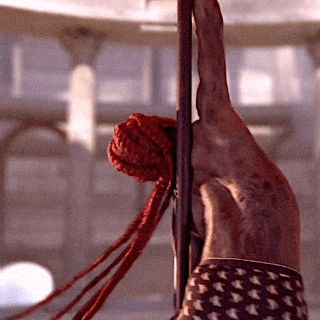
What do you think?
Let me know in a comment below! And while you’re there, make sure you like and reblog this article.
Want to read an article on the paranormal every Saturday? And a real ghost story everyday/whenever I’m bothered? Hit follow!
#satan#satanism#satanist#satan shoes#lil nas x#satanic panic#devil#demons#demonology#demonolatry#demon house#church of satan#satanic temple#anton lavey#lucifer#christianity#history#devil worship#Occult#satanic ritual#satanic#hell#demonic#horror#horror films#true ghost stories#real ghost stories#paranormal#supernatural
224 notes
·
View notes
Text
Close Friends the series (another Thai hope for new stories in BL) ideas
What is up with these mini series Y destiny, Close Friends where they have a short storyline for certain known pairings and leave me devastated that they didn’t make it into a full 12 episode or more series? Why are we stuck with the engineering, university repetitive motives when we’ve had outlines and ideas right in front of us for how to make new groundbreaking Thai stories in this genre??? Unique, Romantic, Fun and great potential to explore new dynamics and characters. Please Close friends choose a series to make into one full series. Anyway here’s how I’d do them starting from my most favorite and desperate want for a full tv series plot, to the ones I can’t be fussed about.
1. KimCop
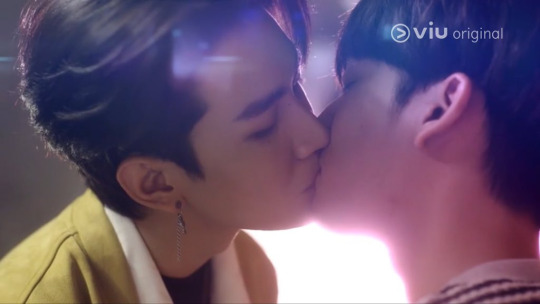
Are you kidding me? We could have had a celebrity/fanboy trope this whole time from Thailand? Why haven’t we gotten yet this idea? Man this needs to be a series, this needs to be fleshed out and give me a full storyline. Like have a spoiled/ arrogant celebrity who wants to go undercover away from his label (feeling bored/frustrated with the environment he’s in and sneaking away when he finally gets out) and meets his number one fan boy who works as cafe barista (cafe shop au damn it) who he knows because he’s been having secret conversations with him through a VR app that he monitors for research on how to create more. Let him pretend he doesn’t know said fanboy but find a way to spend more time with him, let said fan boy not be okay with his attitude and arrogance on the surface but be confused about the other version of himself he speaks to in VR, let us have this. It would be so good, between secret identities, contract living/cafe shop au tropes, we could have something that can be great, with longing, misunderstandings, having the fan boy pretend he’s not affected by the celebrity (due to annoyance by his spoiled persona) when we and the celebrity both know he’s different when he’s speaking to his VR version. Just so much to play with, with this. We need this storyline as a narrative like this is closest to the kinda risks Korea BLS do with their plotlines for BLs and with Thai we know the episodes would be allowed to be longer and properly played out. Plus KimCop are fantastic; they’re made for this, they need the directing, the stellar budget and production but I want this now. Damn you Close friends for laying this in front of me!!!
2. Mii2

Please can I get a coming of age series for this perfection? A coming of age that ends happily and show cases these two’s journey to being together through their pen pal relationship. Can we get self discovery, exploration, acceptance and more. Can we get finding your purpose, your struggles in highschool to fit in, to have friends, to be socially accepted. Can we get that with these two who clearly live opposite lives and find solace in each other. I want my BL answer me 1997/1984 Kdrama!! Like you can have it all! Give it to me 😭 let me learn about Thai history during these times. Let me watch this soft friends to lovers premise Please? I’m begging? From the aesthetic, the time period, the wholesome characters and the potential with this plot, we can have a great unique Thai Bl series that’s still about highschool but show cases a different era. With inside jokes about that time period, with references, and opportunities for nostalgia for certain Thai folks, it’s a win win to me and it’d be BL!
3. JaaFirst

You heard it here I want them because of their chemistry. I couldn’t help feeling so teased and upset that this wasn’t a supernatural thing about a cat who turns human or something (we’ve had mangas based on this, lol even Mew Mew power has a play on this with the main het couple at a time, common) like I would have wanted this synopsis with these two a magical race of people who are able to turn into animals, one of them who loses his memory/ has to find something that will help his race in a certain time frame and finds himself having to stay stuck with Ja’s character who he falls for because he watches and learns about him as a cat. Maybe he stays in his cat form to discover why he was found in Ja’s place with no memory, trying to discover about himself, But there’s times where his human form can roam around depending on certain world building rules. Meanwhile Ja is a cute cat owner who’s unaware. But something is bothering him, it’s making him spiral, he is intrigued by a boy he keeps bumping into at odds times around his area but he can’t find the boy anywhere, and each time they meet he’s a bit standoffish and refusing to let Ja get to know him or help him, he can’t find the boy unless he appears at a certain time and place. And he spends time pining trying to find and get this person not knowing he’s living right next to him moping about his circumstance about not being able to stay human all the time, Like a play on Little mermaid or kdramas like My girlfriend is a gumiho you know these dramas with supernatural beings who have to stay in a contract situation with someone with a time limit (a month/100 days normally) to stay together and get to his goal. Like weird animal supernatural trope but it could work 😭 One it’d be supernatural so unique to this genre, it’d explore a requited but they don’t know trope with a lot of barriers and misunderstandings :( Like damn it why can’t we be having all this Thailand.
4. MaxNat 😭
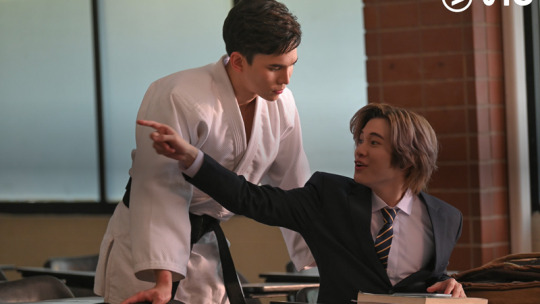
A Karate Kid reboot but with BL 😭 Yes you heard me, between watching Nat fall for the sport and prove to whoever he needs to that he can be a champion due to the help of his headstrong tutor who takes him in, like we’ve got another plot, we’ve got another theme to explore, a new world of learning about the world of Karate competitions, and training to be a champion. Character dynamics that can be fleshed out to have another sports based BL series but this time Thai like yess 😭 let’s stew and stay longer in this I don’t want to do this energy with Nat’s character probably being forced to do the sport because he has no choice, to impress someone, to get revenge on�� a rival who hurt him but slowly realizing that karate is his talent and what he loves to do authentically. A fish out of water experience, as he falls for his strict gruff, cold, and robotic tutor who he learns more about as time goes about why Karate is his all😭 Like yes please.... Haters to lovers, going in with wrong intentions, learning about self worth and finding your purpose/self. Like a chosen one narrative let me have this!!!
See what I mean when I say all these mini series just leave me sad, that Thai BL genre isn’t risky enough to do new things, all you have to do is branch out a bit, try and create stories without the need to get Bl adaptations all the time from novels with the same themes and tropes. Let’s get new themes we see in other countries, let’s have these actors be put to use more and given stories that aren’t just the same old same old. I dunno, watching Y destiny and Close friends, have made me sigh because if people actually put thought and effort into how to improve this genre, and make it more than just a money thing, we could have great stories for Thai BL that actually will shock us, and make us refall in love with the genre. Dunno if what I’m saying makes sense, I just want new stories from Thai BL (don’t get me wrong IPYTM and GMMTV are trying) but I sometimes get frustrated at this explosion of quantity of BL that never has quality, it’s either repetitive or just awful in terms of storytelling. Why? Please Thailand branch out a little, these two series have shown you new plots, and ideas you can play with and create something more interesting and better than the typical lazy plots. Let’s expand Thai BL more. That’s all. Do you guys have your own ideas on these storylines and how to make them into longer series. I didn’t mention the other two because I wasn’t as connected to their plot (Love TalayYoon though) but I really enjoyed Close friends, and I’m sad it’s over now.
51 notes
·
View notes
Text
I think one of the reasons that I don’t care for the Marinette vs. Lila plot, as much as I like writing fics where Lila get called the fuck out, is that it’s… the least interesting.
Out of the Main Five of Team Miraculous, Lila being a narrative foil to any of the others is so much more interesting!
Like sure. Marinette vs. Lila is the basic good vs. evil. The protagonist vs. one of the many antagonists. Not to mention the love rivalry over Adrien. But like…. on top of all that, Marinette’s narrative foil should honestly be Gabriel. And that’s a post in itself so I won’t go into it here.
But look at the opportunities the rest of the Team would have!!!
Lila vs. Adrien:
While I argue that Adrien’s true narrative foil should be Nathalie, just like Marinette has Gabriel, Adrien vs. Lila would be interesting.
Both seem to have mildly similar parental backgrounds, from what we’ve seen. Lila’s dad is out of the picture for some unknown reason, and Adrien’s mom is missing.
While Gabriel does seem to be worse than Mrs. Rossi from the little screentime we’ve seen, both parents are very busy with work and ignore their children.
Both also have to uphold reputations too. While Adrien is ‘the face of the brand’ and more in the public eye, anything Lila does reflects on her mother and therefore Italy itself.
Adrien deals with this by believing the best in people, believing he can help them, and being genuinely nice to others.
Lila deals with it by becoming cynical, thinking everyone has an agenda and that niceness is just politics. Be nice or mean to get what she wants.
Seeing the two of them have a rivalry would be more interesting because we can see what both could have become. And how easily they can become each other even now.
We can see Adrien trying to get Lila to be a better person and learn that people will genuinely love her without lying and faking. That while some people just have agendas, that others are sincere.
Meanwhile, Lila could be trying to get Adrien to be like her. He has the actual money and power to get whatever he wants. It would be easy for him to manipulate anyone into anything.
You can even have it working on both sides! Adrien convinces Lila that some people are genuinely nice, and she tries to refrain from lying to them. Eventually either getting a redemption arc or tossing it out the window.
On the flip side, Lila can show Adrien how her lies can get Gabriel and Nathalie to listen to him more. And he can even go darkside for a short time by getting frustrated with unrequited love and using the tactics on Ladybug, but eventually realizes how shitty that is and stops while apologizing.
Again, the back and forth would’ve been interesting.
Lila vs. Alya:
This one!!! Rena Rouge vs. Volpina! Fox vs. Fox! Truth vs. Lies!!
Seriously! Why set up Lila as a lying fake fox and Alya as a journalist searching for the truth if you’re not going to have them get into a fight?
Especially because while Marinette’s foil is Gabriel and Adrien’s is Nathalie, both Alya and Lila are the 'third team member’ to both sides.
I already went over this before, but I think of it would’ve been great if Lila’s lies were outed, but everyone believes her lies were just “new kid trying to make friends quick” lies.
Alya, pissed that she was tricked and resolving to not get tricked again, continues to be suspicious of Lila. Eventually she realizes that Lila is a full-on manipulator, only pretending to have repented to get close to people like Adrien and Marinette.
Alya trying to find the Truth while Lila makes more Lies could make a good back and forth battle.
Especially as Alya would be simultaneously struggling with the idea of exposing the truth due to realizing how the truth can hurt. In the beginning she wanted to find the story and dig up any secrets like the identities of the Heroes. But after becoming a Hero herself, she realizes why the lies and secrets about her identity are in place. The safety of herself and her loved ones.
Meanwhile, Lila is struggling with her lying tactics. Because despite not actually having famous connections and even after the annoyance from the class finding her out she was lying, they still like her. They still care about her and want to be her friend.
Lila vs. Nino
I will admit that Nino is the least developed of the five which is a crime because he’s great and deserves better but that’s for another post.
It would be interesting because he’s the least like Lila. Marinette is the one with all the connections that Lila claims to have and is the 'Love Rival’, Adrien is the one with a similar history but on a different path, Alya is the 'opposite’, and Chloé (who I will get to) is the Mean Girl. But Nino’s none of that.
Still, Nino is friends with everyone Lila targets. And he’s a protector type. Like bruh. He gets the Miraculous of Protection!! That’s just Canon.
The idea of everyone thinking Lila is genuine, but Nino is the only one who get bad vibes and is wary of her could’ve been a good story.
Especially because this would make sense for extending this plot!! Like, Nino is the only one of the four who can’t disprove Lila’s lies himself. Marinette could just be Ladybug and otr Lila again or call any celebrities she knows. Adrien could do the same as Chat, or just by telling people that Ladybug called Lila out. Alya can contact the Heroes and knows how to research anything Lila claims. Chloé can do the 'call up celebrities’ thing too. Nino being unable to prove Lila’s a fuck makes more sense than everyone suddenly being dumb for the plot to work.
It’s also so much harder to have Lila turn people against him! With Marinette, it’s the “sure she’s nice but jealousy makes a vicious monster out of the best”. With Alya it could be either the “jealous I’m bffs with Ladybug” or “jealous of her getting close to Marinette”. With Adrien, Lila could claim that he’s the one pretending to be nice while manipulating them. And Chloé is self explanatory. But Nino is none of that.
It might not have quite the back and forth like the others, but that is also why I like it. It’s more subtle. It’s not a full on battle between the two. Neither is really a threat to the other directly.
This would also make sense writing-wise for why Lila is both built up as such a threat but is also doing nothing to actually be a threat outside of, like, four episodes. She’s subtle, and Nino’s protection of his friends is just as subtle because he plays defense.
As a bonus: This would also give Nino more screentime and development.
Lila vs. Chloé
This would’ve been so good because, like, they both start as antagonists for the Civilian plot. And there’s two ways that I would go with this.
The first, which I like better because it’s Chloé Redemption: As Chloé learns to be a better person, Lila begins becoming worse and worse.
Both start as Mean Girls for the class, but in different ways and in ways that are reverse of each other. Chloé seems like the typical 'rich girl bully’, but does have hidden niceness and just wants to be loved. Lila seems oh so nice, but is cynical and only seems to want power and attention.
Chloé being the one to try and out Lila’s lies and not being believed makes so much more sense because, well, Chloé is an asshole and the class is just barely beginning to trust her. If they trust her at all. But compared to the other four, she’s the least trustworthy.
However, Chloé is also much more morally gray than the other four. So she can play Lila’s games just as hard. Lean into the lies just enough to turn it around on her. Much like the Adrien plot, you could have Chloé learning to use these skills for 'good’ to help people while Lila continues to just get what she wants.
This would eventually come to a head when Chloé’s redemption arc gets to the point where people do legitimately believe she has changed and trust her.
The other story option: Both hate Ladybug and go Darkside, but for different reasons.
Yes this includes keeping Miracle Queen which hurts me, but it also includes keeping Chloé’s character development by changing a few things.
So, Lila hates Ladybug because Ladybug ruined her plans, and is joining Hawkmoth because she can use his powers to further manipulate the situation and get what she wants.
Chloé hates Ladybug because she feels betrayed and abandoned by her, and joins Hawkmoth because at least he is upfront about how she’s only useful as a tool.
Both are doing the same things, but one is an asshole while the other is sympathetic. And it leaves room for the narrative, and the Heroes, to offer both of them a redemption arc and see who takes it.
Anyway! That’s my point on how I think literally any of these would be more interesting than making Lila be Marinette’s problem!!
424 notes
·
View notes
Text

Why Jillian Sucks
Hi, welcome to Odyssey Mystery Hour! I'm your host @gritsandbrits and today I'll be talking about a hot topic in the AIO fandom! Wanna know the tea? Keep on reading!
In the weeks I started getting back into the radio series, the newer episodes have started to irk me, mostly because of one of the more annoying additions: Jillian. Marshall. 😬😬😬
Even though I ship Jason with my self insert OC this not going to be about her. There's a lot of reasons why I do NOT like the idea of Jillian x Jason becoming a canon thing on the show. I hope to describe these feelings as best I can.
Who is Jillian you might ask?
Well to put it simply, Jillian is what happens when a Soccer Mom and a TikTok boyfriend mate and spawn an unholy baby and name them Rachel Berry. Out of the aspects of Nu!Odyssey I dislike, Jillian is the one thing I truly despise. Thankfully I've met fans who share the exact sentiment! 😁😒
Double-N Annoying, Double-O Nincompoop
Making her debut in 2018, Jillian is described as lively and upbeat, if a little high strung and immature; the perfect recipe for Kid Appeal! Before she moved to Odyssey she lived in different cities and worked nineteen jobs before becoming roommates with Connie and her sister Jules.
Now this is actually a fairly interesting set up: a new character struggling to find purpose only to discover it in a quaint small town. But as it turns out her going through that many jobs seems to be more than just struggling to find purpose.
When I first saw her design my thought immediately went to the smarmy classmates I went to school with.
We're introduced with this iconic line: "Hi!! I'm Jillian Marshall, double-L Jillian, double-L Marshall! It's so nice to meet you!"
With that one sentence I knew I was about to die.
The following episode has Jillian bumbling through every job interview much to Connie's duress after which she conveniently ending up working at Triple J Antiques...the same place Jason works!
A little backstory on Jason: he is the adult son of John Whittaker, one of the show's main character, and a bit of an Ensemble Darkhorse. He was introduced as a secret agent meant to bring action and intrigue into the show. He was set up as a charismatic and reckless sort of guy clashing with the calmer Jack Allen. After the Green Ring Conspiracy Saga, Jason officially retired from James Bonding and settled down to work at the Allen's antique shop.
Given his immense popularity there's understandable concern for how he is written and who he gets paired up with. So what does that have to do with Jillian.
Well, the idea of Jillian working at the same exact place as Odyssey's resident bachelor and calling him cute raises a few eyebrows.
"B-but Grits all she did was call him cute! You're reaching too far into this!"
Am I? Look I know this wouldn't be much of a big deal too but that is a subtle tactic the writers threw in to get the cogs turning for Jillison. Jason is clearly uninterested and even implied to dislike her. Jillian bemoans this but Connie reassures her that that's not the case. But hey at least she called him cute so OF COURSE she's going to end up being his love interest!
To me removing a character's core trait to justify a romance means you do NOT know how to actually write a compelling romance. It's trite, it's forced and painful to listen to.
It's also obvious she's a replacement for Bernard, given they have similar personalities and her brief stint on TV (which she also failed at lol). But whereas Bernard was actually endearing, Jillian seems more of a cliche womanchild with zero self awareness and tact. No actual depth, just a personality that is incredibly dumbed down and even insulting. Seriously they made her the dumb blond stereotype in an era where we should've moved on from that! 🤦
Did I mention she goes to church?
Yep she's gonna be one of those Christians.
Literally Loveless, Literally!
Oddly enough the narrative frames this as a rivals to lovers thing, where Jason is both the charismatic friendly guy and the super uninterested Straight Man. The constant twisting the turning makes him go OOC. See we know he's fit better as the former because that goes in line with his canon personality. But when they make him the latter he just comes off as unnecessarily mean. This is turns frames Jillian as someone we should pity: "Oh the attractive male doesn't like me because I went into his office without permission!!"
Wouldn't it make more sense for Jillian to be the one uninterested in a romance since her focus in to find a job/better purpose and romance might distract her? That would make a fun subplot...IF SHE WASN'T OBNOXIOUS!
A pattern I noticed and several fans pointed out: Jason's previous love interests were consistent in that they were strong minded women who challenged him in different ways. Their personalities bounced off creating a fun dynamic that was entertaining to see. Even though they didn't end up with him, you can still see and hear and feel their chemistry which is my goal for Jason x OC. Tasha doesn't make Jason OOC & they had a bittersweet arc, so their interactions were organic. Monica only made him OOC because she was a villain actively manipulating him. So again that worked in terms of story and led to Monica's redemption if my memory serves.
However, Jillian's dynamic is not that fun to listen to. You can feel her annoying Jason through the airwaves. She's strong but only in the sense of feeling something hard underneath your back laying on the bed and realizing that's just your earbud. She's vibrant yes but what else? She doesn't have any unique traits to contrast Jason, and any attempt at a contrast would mean making him act out of character. Adding her bumbling clumsiness and annoying voice, Jason would get tired of her very quickly. He's the type to go for people to have intelligent conversations with, not make him lose braincells. She could very well bring out the worse in him, it'll be an unhealthy relationship.
Here's a tidbit worth mentioning: the VA for Jillian actually auditioned with Jason's VA Townsend Coleman. Now that is big ass red flag right there! No hate towards the actress, just throwing that out there. There's also a facebook page dedicated to Jillison. Typical FB stupidity ramped up to eleven, or AIO fans who see something in Jillian; or at least THINk they see something worthwhile in her.
It doesn't help the writers keep insisting that these two go well together. The audience knows they do not work well as a pair but the narrative keeps insisting they are anyways. I recall an episode that had them pretend to be married while undercover and it was bad. Like REALLY humiliating to see Jason put in that position. He also told her to shut up much to my joy because she could NOT stop being irritating for five minutes. Alas the show still tries to justify Jillian being the Perfect Woman for Jason when she's anything but. And not even endearingly imperfect.
Follow Up
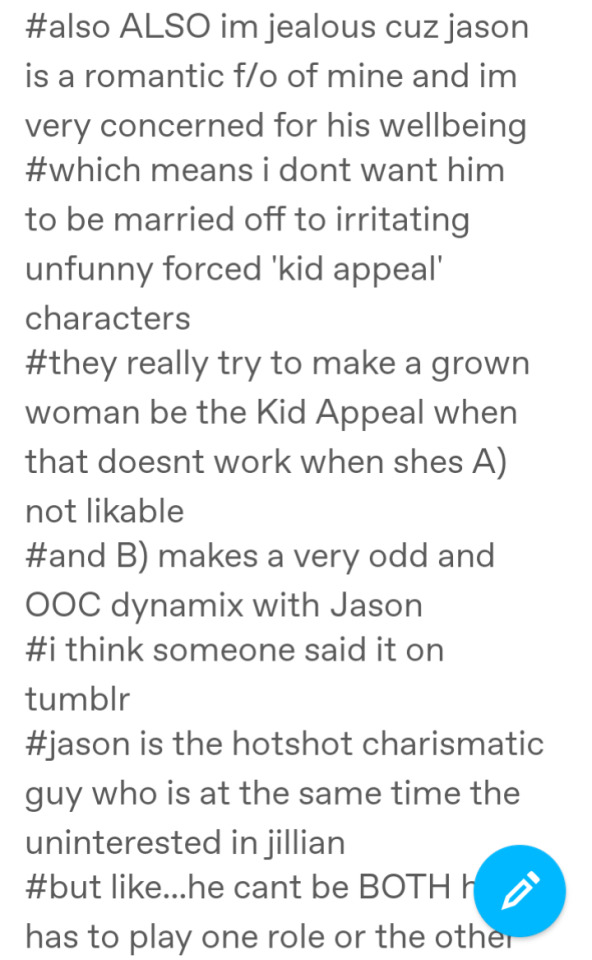
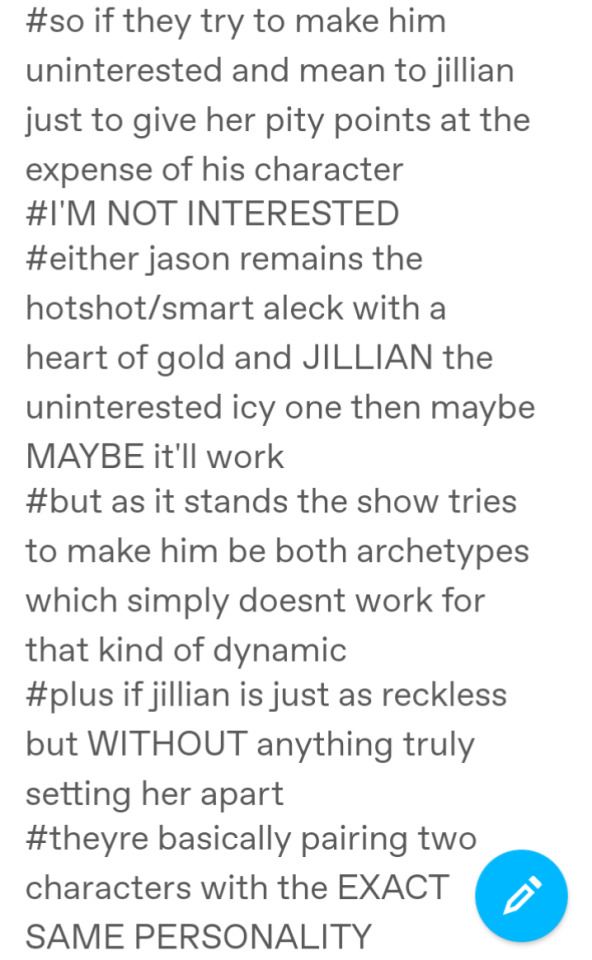
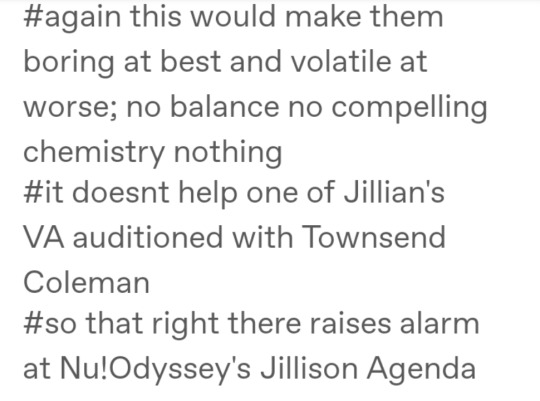
These tags I wrote on one of the AIO posts describes how I feel about Villain Marshall and the Jillison coupling as a whole. It just wouldn't work because Jason needs someone that can actually CHALLENGE him, have their own personality that can bounce off his (without being forced), and most importantly DOESN'T AGGRAVATE THE FANDOM!!
I have not met a single person anywhere that say they like Jillian. It's a different story apparently on the Club App - they like her for reasons I'm too cowardly to find out. But no, she sucks as a character. She makes a annoying friend, and is not a good addition to the show, much less a good love interest.
The only good thing she brought us are the nicknames we gave her 😌
That's all for now thank you for tuning into the Odyssey Mystery Hour. Next week I'll be talking a bit more about my OC Vanessa and her role in the world of Odyssey! Goodbye and make sure to lock your doors to prevent Jillian from coming in!!
#adventures in odyssey#jason whittaker#anti jillison#aio#rant#radio drama#adventures in odyssey radio show#jillian marshall#anti jillian marshall
28 notes
·
View notes
Text
Anon Master List
TITLE: A Gift RATING: T WORD COUNT: 912 ADDITIONAL TAGS: Sirius Black Lives, Fix-It, References to Footloose (1984), Fluff, Implied/Referenced Alcohol Abuse/Alcoholism, Implied/Referenced Child Abuse, Harry is only mentioned, he doesn't appear, Number Twelve Grimmauld Place, Order of the Phoenix (Harry Potter), Canon Compliant, technically, Hopeful Ending SUMMARY: This was meant to be something very different but what it turned into was soft affection and movie night at 12 Grimmauld Place and learning each other again. READ IT ON AO3: A Gift
TITLE: the beauty of a secret (you have to keep it) RATING: G WORD COUNT: 14600 ADDITIONAL TAGS: Fake/Pretend Relationship, Slow Burn, Fluff and Angst, Remus's supportive parents, Christmas Fluff, THERE WAS ONLY ONE BED, this is really soft and so self-indulgent, First Kiss, Mutual Pining, POV Remus Lupin SUMMARY: When Remus asked Sirius to be his fake-date for them to visit his parents for the Christmas holidays, he hadn't expected it to go that well, not really. No one, least of all Remus could have predicted how rapidly it deteriorated, especially with his long hidden feelings that were too close to the surface. READ IT ON AO3: the beauty of a secret (you have to keep it)
TITLE: Be My Baby RATING: M WORD COUNT: 21876 ADDITIONAL TAGS: wolfstar, RS Fix It Fest 2020, Dirty Dancing AU, 1960s America, Coming of Age, Coming Out, Black!James, Cuban!Sirius, Alternate Universe - Historical, Alternate Universe - Muggle, Fluff, Romance, Dancing, Summer Love, Period-Typical Homophobia, Period-Typical Racism, but both are pretty mild!, Meet-Cute, Getting Together, First Time, dance SUMMARY: It’s the summer of 1963, and 18 year old Remus Lupin discovers dance, love, and even himself. (A very romantic and very gay Dirty Dancing AU.) READ IT ON AO3: Be My Baby
TITLE: Good Year RATING: T WORD COUNT: 1024 ADDITIONAL TAGS: Alternate Universe - Canon Divergence, Sirius Black Lives, Remus Lupin Lives, Professor Sirius Black, Professor Remus Lupin, Post-Harry Potter and the Deathly Hallows, Fluff, Domestic Fluff, middle-aged wolfstar, they’re alive and happy and they kiss and laugh a lot SUMMARY: Sirius and Remus one happy morning before the start of their first year of teaching at Hogwarts together. Set the year after the end of the Second Wizarding War. READ IT ON AO3: Good Year
TITLE: Hic sunt dracones RATING: E WORD COUNT: 4941 ADDITIONAL TAGS: Getting Together, Friends to Lovers, First War with Voldemort, Canon Compliant, Happy Ending, Romance, Makeup, Mirror Sex, Intercrural Sex, Sharing a Bed, RS Fix It Fest 2020, POV Remus Lupin SUMMARY: Remus and Sirius try putting on makeup and end up trying a lot more: sex, kissing, and maybe even talking about feelings. READ IT ON AO3: Hic sunt dracones
TITLE: In the Shadow of Your Heart, It's the Only Way I Can Escape RATING: M WORD COUNT: 10032 ADDITIONAL TAGS: Alternate Universe - Historical, Alternate Universe - Victorian, Alternate Universe - Muggle, Magicians, sort of a The Prestige au, POV Alternating, Non-Linear Narrative, POV Sirius Black, POV Remus Lupin, Rivals to Lovers, Enemies to Lovers, Sort Of, Strangers to Lovers, magician Sirius, Magician Remus, escape artist Remus, Non-Sexual Bondage, Remus is sort of based on Houdini, Buried Alive, Everybody Lives, Nobody is Dead, I promise nobody dies SUMMARY: The lights glittered upon the stage, dust particles floating, the light catching on the shiny buttons of the man’s jacket. The boards creaked as he strutted across them, a faint sound only heard if you were listening for it. The heavy velvet curtains hung on either side of the stage framing whatever spectacle was to occur. Or where two sort-of rival magicians perform on stage, confront mortality, and realize that past passion can be present love. READ IT ON AO3: In the Shadow of Your Heart, It’s the Only Way I Can Escape
TITLE: Just Sleep RATING: T WORD COUNT: 1403 ADDITIONAL TAGS: Raising Harry Potter SUMMARY: Remus didn't want to open the door but he almost closes it when he find Sirius back a kidnapped harry under his coat. READ IT ON AO3: Just Sleep
TITLE: La Vie en Rose RATING: G WORD COUNT: 1732 ADDITIONAL TAGS: Book 5: Harry Potter and the Order of the Phoenix, Canon Compliant, Post-full moon, Pining, Mild Hurt/Comfort, Sirius Black Speaks French, Depressed Sirius Black, Song: La Vie En Rose, POV Sirius Black, Singing SUMMARY: "Remus was lying against him, fast asleep and very human. Sirius was struck with how much older he seemed, now that he was close enough for Sirius to study him. But he still looked as beautiful as ever." It is only Remus and Sirius left in Grimmauld Place after the children return to school. This alone time leaves Sirius facing feelings he buried a long time ago. READ IT ON AO3: La Vie en Rose
TITLE: night rides RATING: G ADDITIONAL TAGS: Art, Digital Art, Alternate Universe - High School, Motorcycles, Fluff SUMMARY: first time riding the motorcycle together READ IT ON AO3: night rides
TITLE: On how to become a DDA teacher RATING: G ADDITIONAL TAGS: Alternate Universe - Everyone Lives/Nobody Dies, Everyone Is Alive, Living Together, Marauders, Marauders Era (Harry Potter), Marauders Friendship (Harry Potter), Domestic Bliss, Domestic Fluff, trying new things, Happy Ending, RS Fix It Fest 2020, Fanart, Fix-It SUMMARY: Remus prepares himself for his new position as Defense Against the Dark Arts teacher. Just some domestic bliss drawn for the RS Fix It Fest 2020. READ IT ON AO3: On how to become a DDA teacher
TITLE: On The Mat RATING: E WORD COUNT: 14265 ADDITIONAL TAGS: Meet-Cute, Getting Together, Yoga, Yoga Teacher Sirius Black, Yoga Student Remus Lupin, Dubious use of a yoga mat, Anal Sex, Rimming, Blow Jobs, Deep Throating, safe sex, we are pro condoms in this fic, Fluff and Smut, Top Sirius Black, Bottom Remus Lupin SUMMARY: The intimate happenings of Remus Lupin, Sirius Black, and a yoga mat. READ IT ON AO3: On The Mat
TITLE: The Pipe Under The Sink RATING: T WORD COUNT: 5253 ADDITIONAL TAGS: FixItFest2020, trying new things, wolfstar, unemployed!Sirius, bookshop!Remus, Baker!James, Alternate Universe - No Voldemort, muggle problems, Domestic Fluff, Baby Harry Potter, Self-Esteem Issues, Love SUMMARY: After being together for so long, Sirius worries Remus doesn't find him sexy anymore. Sirius finds some inspiration from James and decides to show off his sexiness by fixing the kitchen sink...the muggle way. READ IT ON AO3: The Pipe Under The Sink
TITLE: Quality Lighting RATING: T WORD COUNT: 4959 ADDITIONAL TAGS: Alternate Universe - Modern Setting, Alternate Universe - No Magic, Alternate Universe - College/University, Erotic Photography, Get together fic, Happy Ending, POV Remus Lupin, POV Sirius Black SUMMARY: “Give it back!” Remus pitched forward in a desperate attempt to swipe his phone back from his roommate.
“Why?” Sirius asked with a laugh as he started to scroll. “Am I going to find your OnlyFans content or something?”
Remus choked out a laugh of his own. “Very funny. Now please—”
“Oh.” READ IT ON AO3: Quality Lighting
TITLE: We’re Not Like Them RATING: G WORD COUNT: 21574 ADDITIONAL TAGS: First War with Voldemort, Post-Hogwarts, Muggle London, London in the Eighties, Hyde Park, James Potter & Lily Evans Potter Live, Order of the Phoenix - Freeform, Angst, Marlene and Remus's friendship, Godric's Hollow, Character Study SUMMARY: Sirius leaves the flat for hours on end and doesn't tell Remus where he's been. Remus skulks silently in the shadows, forgotten by everyone he once called a friend, and secrets are being kept between the four of them. Remus doesn't even know if they will last the war, and Sirius decides that he wants a child. Remus thinks that they're twenty-one, fighting for their lives, and not like James and Lily. READ IT ON AO3: We’re Not Like Them
TITLE: The Words Beneath Your Door RATING: M WORD COUNT: 11723 ADDITIONAL TAGS: POV Remus Lupin, POV First Person, Pining, Not Actually Unrequited Love, Getting Together, Roommates, Canon Divergence - Post-Hogwarts, Marauders Era (Harry Potter), First Kiss, Remus Lupin is a florid little shit, and Sirius reads Muggle encyclopedias for fun, gratuitous use of The Runaways, and cardamom biscuits, Fix-It, Domestic, and very very toshy, Implied/Referenced Drug Use SUMMARY:It is 1979, Remus is steadily losing control of his higher functions, and Sirius won't stop fucking touching him. Perhaps the two are related, but there isn't enough space left in the cold fusion core of Remus' brain to parse that out. READ IT ON AO3: The Words Beneath Your Door
TITLE: Young Hearts Intertwined RATING: T WORD COUNT: 11643 ADDITIONAL TAGS: Fix-It, Alternate Universe - Canon Divergence, First War with Voldemort, Fluff, Schmoop, Weddings, Established Relationship, Summer, Welsh Remus Lupin, Desi Potter Family (Harry Potter), Desi Sirius Black SUMMARY: There’s a special kind of magic to a wartime wedding. READ IT ON AO3: Young Hearts Intertwined
TITLE: You're My Lover, Not My Rival RATING: M WORD COUNT: 3734 ADDITIONAL TAGS: Book 5: Harry Potter and the Order of the Phoenix, Friendship/Love, Best Friends, Getting Together, Casual Sex, Happy Sex, Threesome - F/M/M, Prophecy, Drinking & Talking, Smoking, Fix-It, RS Fix It Fest 2020, True Love, Canon Divergence, Bisexuality SUMMARY: Remus can't do relationships, or so he thinks. READ IT ON AO3: You’re My Lover, Not My Rival
#rs fixit fest 2020#rs fixit fest#wolfstar fest#remus lupin#sirius black#mod post#master list#anonymous master list
144 notes
·
View notes
Text
The General’s Mate
Cherik Week- Day 3: AOB Dynamics / Flower Shop AU
Written for my own prompt: Erik is the General of a small a small kingdom on the outskirts of Genosha. Shaw’s army invaded his lands, loots his home and kills his mother, wife and daughter. In a bid to get revenge, Erik, with the help of rival Queen Emma and her army attack the Genoshan capital and Erik kills Shaw himself. Amongst the loots of the palace is Shaw’s harem and its occupants. Erik’s soldiers drag in a young Omega with blue eyes and red lips, who apparently was Shaw’s favourite. With every intention of killing the Omega like Shaw killed his family, Erik tells his soldiers to leave the Omega with him. But he soon learns that the Omega, Charles, is also a victim of Shaw just like himself- that Charles, a son of a Lord, was sold to Shaw by his stepfather and kept captive against his will. Anger drained away from his system, Erik hands Charles a pouch of gold coins and hands him the reins of a horse and tells him make his way home, but Charles refuses because he couldn’t home carrying the reputation of being Shaw’s bed warmer. With no other place to go, Erik gives Charles shelter under his roof while a slow friendship builds between them in the process.
Ratings: Mature
Warnings: Language, mentions of abortions
Charles wakes to the sounds of whimpers and groans-- as he has been for the last two days. The situation is worsening, for Erik has begun trashing his head against the pillows and flinging his arms in the air-- much in the fashion of sword fighting-- all the while cursing and gritting his teeth. The behaviour is typical of fever induced nightmares, and the fever in turn must be caused by the wound on Erik’s torso.
The moonlight peeping into their small hut though the opening vent in the far wall illuminates Erik's profile dimly where he's sleeping on his bedroll a few feet away from Charles. The gentle breeze of spring ruffles the hem of Erik’s tunic, exposing the severe gash that begins below Erik’s collar bone and ends in the vicinity of his heart. Infected with pus, the skin around the cut has turned yellow. Whoever cleaned the cut-- if someone even had-- has done a poor job of removing the blood. The dried blood clogging the exposed flesh is preventing the wound from healing. The frequent brushes of the fabric on the broken skin must no doubt be painful.
Charles is tempted to rush to Erik’s side, stroke his fingers through Erik’s short crop, cradle his head and ease the pain away, but he doesn’t dare move from where he’s sleeping on his own bedroll. As much as he hates seeing Erik in any form of pain, he also doesn’t dare disturb whatever form of truce that has been building steadily between them in the past few months. Contrary to whatever horrid narratives there might be to their relationship on the streets-- and Charles knows there are-- the bond that they share in this small space enclosed by mud walls is something pure, something that transcends the grasp of the common tongue.
It’s delicate and yet strong, subtle and still bold, insignificant and yet so overpowering. Charles likes to call it friendship, because Erik has been nothing short of an exemplary friend to him. He listens when Charles speaks-- not just hears, but listens. He respects Charles and values his views. He has never undermined Charles on the account of him being an Omega. In every sense of the word, Erik has treated him like an equal. If that isn't friendship, then what is?
These days, however, Charles is finding it difficult to believe that ‘friendship’ can barely contain the bond they share. Some days, Erik will bring a sweet-treat from the market Charles had mentioned liking in passing, or he'll smile softly at Charles over their chess board, or hold Charles' gaze even in a crowd, and the word crumbles in Charles' heart and turns sour.
Sometimes the urge to touch Erik is so strong that it knocks Charles over. Sometimes the urge to bury his nose in the crook of Erik's neck and inhale his scent is so potent that it nearly disrupts his senses. Sometimes, the urge to just be close to Erik is so powerful that it leaves Charles trembling in its wake.
Erik groans again, pulling Charles from his thoughts. Charles twists his trembling hands in the threadbare bedsheet to keep them from reaching out to Erik. There's still a barrier between them despite how far they've come from their initial days of acquaintance. A barrier Charles didn't dare breach.
A mixture of white willow bark, turmeric and rosemary ground in frankincense oil should reduce the inflammation and infection, and a tonic of ginger and basil should bring the pain induced fever down. Charles creates a list of the other ingredients he needs in his head, and makes a note to procure them from Angel the first thing in the morning. He may not be able to comfort Erik and ease his pain, but he can certainly concoct a medicine that could.
One eye trained on Erik, Charles barely sleeps through the night.
The next morning, Charles looks at the assorted herbs and plants on the table in front of him, checking it off one by one against the list in his head.
'Is that all?' Angel asks with a suggestive smirk.
Satisfied, he nods. 'Yes, that is all.'
'What are these for, lover boy?' Angel goes around the counter of her small flower shop that doubles as Charles’ source of medicinal herbs, and retrieves a large lotus leaf. 'To increase your Alpha's performance?'
Charles flushes brightly, and it only serves to deepen the smirk on Angel's face. Despite her vulgar sense of humour, Angel is one of few who doesn’t treat him differently for his past, and Charles suspects that it has something to do with resemblance to her own.
'It's fine,' she says, wrapping his purchases in the leaf and securing it with a twine. 'I'm not going to talk. I can keep a secret.'
He doesn't comment, mostly because he's impatient to get home and begin working on the medicines. He leaves Angel's shop flushing after she winks and wishes him luck.
The rest of Charles' day is spent in boiling leaves and reducing them to create a tonic, grinding a root to extract its oil, or in mixing herbs to create a salve.
He's grinding the last of the mixtures into a fine paste when Erik enters through the door. Charles is so lost in the process that he almost jumps a foot in the air when Erik calls for him.
'Erik!' Charles beams, wiping his gritty hands on his white robe. ‘Oh dear, is it dark already? I barely noticed.’
Erik looks around their home, at the mud stove and takes in the various vials and bowls containing tonics and ointments. A small smile tugs at his lips. ‘Clearly.’ He walks further into what classifies as a kitchenette and picks up a bundle of twigs. ‘What are these for?’
Charles bites his lip. Oh, dear. What if Erik refuses to be treated? What if he laughs at Charles or waves away his concerns? He should have consulted with Erik before concocting tonics and balms. Regardless, it’s too late for that now, so Charles says slowly, ‘You have a wound on your chest,’
‘Yes,’ Erik says, making it sound more like a question than an affirmation.
‘Well, whoever cleaned it has done a poor job, and now it’s infected. The infection might get into your bloodstream if it isn’t treated.’
‘And this is?’ Erik gestures vaguely at the mess Charles has made around their kitchen.
‘Medicine,’ Charles says, wringing his hands, ‘It should stop the infection from spreading and help in healing the wound.’
‘And you…’ Erik’s eyes rake over a dozen vials filled with an amber fluid, ‘made all of it?’
Charles nods vigorously.
Erik stares at Charles for a long moment, head tilted to one side, like a cat would look at a ball of yarn, amazed and skeptical at the same time. ‘Right,’ he says just when Charles begins to think that either Erik would begin laughing at him or walk right out the door. ‘Then we should get right to it, I suppose. What do you want me to do?’
Charles sighs in relief. This, Charles knows very well. ‘I can’t apply the medicine without thoroughly cleaning the wound. So please sit down and take off your tunic.’
A heat spreads through Charles’ cheeks even as he says it, and he turns towards the stove to hide it. Erik moves behind him as Charles busies himself with boiling a bowl of water. Once boiled, he lowers the bowl from the fire, grabs a bundle of clean cotton cloth, arranges a few other vials he'd need on a tray and goes to where Erik’s sitting on the bedroll, legs outstretched in front of him and back leaning against the wall.
A flush spreads anew on his cheeks on seeing Erik's bare torso. It's a miracle that the contents of the tray hasn’t spilled out from his unsteady hands. Opting to stare instead on the contents of the tray, Charles comes to sit on the bedroll beside Erik.
This close, Erik's scent is a dizzying thing and his body heat is impossible to ignore.
Take a hold of yourself, Charles tells himself, taking shorter breaths through his nose. Erik's injured, he needs medical attention, not his fumbling ones.
'Here.' Charles picks a vial containing a clear liquid from the tray and hands it to Erik, decisively not looking him in the eye. 'Drink this. It'll bring the fever down.'
Erik takes the vial wordlessly and drains down the contents with a wince while Charles folds a length of cotton cloth and dips it in a bowl of spirit.
'This might sting a bit,' Charles says in warning, leaning forward to wipe at the wound. Up close, the cut isn't as bad as Charles had assessed it to be. The infection is localised. Cleaning and draining away the pus should help it heal faster.
Erik hisses as the cloth drags against the bruised skin, the lumps of dried blood resisting the movement.
'Sorry,' Charles whispers and squeezes Erik's shoulder once with his other hand. 'How did this happen?'
'Az and I were practicing. He nicked my skin by mistake.' Erik's voice is barely above a whisper, and his soft breaths whisp against the skin of Charles' nape, tinkling every hair follicle in its wake. Charles barely suppresses a shudder.
'Didn't you have it looked at by a physician?'
'I didn't think it would turn septic,' Erik admits sheepishly.
Charles hums in reply. With the dried blood removed, Charles cleans the wound with water. He dips another piece of clean cloth in a tonic and dabs it on the cut to drain away the pus.
They spend the next few minutes in comfortable silence as Charles continues to drain the pus from the cut. At least, it isn't so bad that it would need stitches.
'How did you know?' It's Erik who breaks the silence. 'I don't remember telling you.'
'You were having nightmares for a couple of days now, and I figured it was because of the injury,' Charles says risking a glance at Erik.
'Oh. I'm sorry-' Erik stutters, chagrined. 'I'm sorry if I disturbed or kept you awake-'
'It's okay, Erik.' Charles smiles soothingly. 'And in a way, it was a good thing I noticed. Otherwise, the septic would have spread.'
Erik doesn't reply to that and Charles continues with his ministrations. He fills the cut with a salve after draining away the pus and places a clean piece of cotton over it. Cutting another long, rectangular piece of cotton, Charles loops it around Erik's chest to keep the salve in place.
The wound has to be cleaned after two days and the process has to be repeated until the cut dries completely, but Charles already knew that. He’d mixed enough medicine to last them a month.
Still, not daring to look at Erik, Charles picks up the empty vials and the bits of the dirtied cloth on the tray and moves to get up, only to be stopped by Erik’s warm hand on his arm.
‘Thank you,’ Erik says sincerely when Charles finally looks up. There’s something deep in Erik’s eyes, an emotion that conveys so much more than the gratitude coming out of his lips. ‘I… Thank you.’
‘It’s fine, Erik,’ Charles smiles gently, but makes no effort to move from the spot.
Erik nods. ‘Where did you learn all this?’ He asks, eyeing the tray and the remnants of medicine it contains.
‘Oh,’ Charles says, placing the tray on the floor beside him and training his gaze on the patch of dried green paste on the folds of his robe.‘I’d always been interested in medicine, I suppose. Even as a child I used to run to the gardens and dirty my attire trying to gather herbs. It drove my mother mad.’ He chuckles at the memory of his furious mother chastising him and the servants for allowing Charles out of the Mansion in the first place. ‘My mother had thought that I was acting on behalf of a child’s curiosity and that my antics would fade as I grew up. But it didn’t. It only got stronger. My father was always supportive, and it did help that he was the Lord of Weschester. The title helped him procure books on medicine from various sellers. By the time I was fifteen, half of his library was filled with my books. I studied those books religiously.’ A woeful smile ghosts over Charles’ lips at the memory.
Erik doesn’t reply, content to listening to Charles speak. He’s a comfortable presence at Charles’ side, his hand a warm brand on Charles’ arm.
‘After my father passed away my Mother remarried,’ Charles continues. ‘And then Shaw’s eyes fell upon me.’ Erik snarls at the mention of the name. Maybe even Charles would have if he could muster the anger and energy to spend on a dead man. ‘I packed a few books in my trunk when I came to Genosha, and they were my only companions when I was bound to Shaw’s harem.’
Erik’s hand moves further down Charles’ arm to curl his long fingers around Charles’ palm, as if to provide comfort in a way words can’t.
‘And all that knowledge I had accumulated over the years didn’t go to waste in the end like my mother thought it would. It helped me in stopping my pregnancy.’ Charles’ other hand comes to clutch at the robe over his stomach, and his voice wavers when he says, ‘Twice.’
‘I’m sorry,’ Erik whispers. Coming from Erik, it’s more than a mere condolence, for he, too, has lost his child.
‘It had to be done,’ Charles says, shaking his head. He blinks his eyes to clear it of the moisture covering it. ‘I couldn’t let Shaw’s spawn enter this world. I couldn’t-’ Charles stops to take a shaky breath. ‘Besides, what future would a concubine’s child have? For it would have forever borne the reputation of being a whor-’
‘No!’ Erik cuts Charles off with a severe finger on his lip. The steel in Erik’s voice rattles around the four walls upsettingly. ‘Never call yourself that. Never.’
Charles smiles woefully. ‘That’s what I am to the world, aren’t I?’
That’s what he’ll always be to the world. Shaw’s whore.
‘Fuck the world,’ Erik snarls. Charles would have pondered over the sudden anger in Erik’s eyes if he hadn’t been surprised by the outburst. ‘Fuck the world,’ Erik says again, a little softer this time. ‘You’re so much more than that, Charles. You’re brilliant, kind, honest and generous. You were kind and generous to me even when I didn’t deserve it.’
Charles shakes his head to protest, but Erik continues, ‘It’s true. I spent many years believing that killing Shaw would bring me peace. It gave me closure, yes, but it didn’t bring me peace. You did. You brought me peace. You showed me how to smile again. You taught me how to be happy when I believed that I had buried it with my family. You brought back love into my life when I had given up hope.’
Erik stops, and blinks several times, as though he,too, is surprised by his confession. Charles, for his part, can only gape at Erik in equal parts confusion and surprise.
Taking Charles’ other hand gently from where it’s twisted in his robe, Erik inhales a deep breath, and says, ‘You are the light in my world of darkness, Charles. And if you’ll allow me, I would like to spend the rest of my life proving it to you.’
There are many things Charles could say to that. He could say that Erik’s the only one who has respected him for who he is. That Erik’s the only friend he has ever had in his life. He could say that he probably fell in love with Erik the day Erik had angrily handed him a bag of gold coins and the reins of a horse and had told him to go home without expecting anything in return. Charles could say a lot of things, but he can’t. Not when his tongue is stuck to the floor his mouth. So he tugs on Erik’s hands that are holding his’ and pulls Erik into a fierce kiss.
~3 years later~
‘Is that all?’ Angel asks from behind the counter.
Charles ticks off ‘5 bundles of waterhyssop’ from the list and shoves the parchment into the pocket of his robe. ‘Yes, that would be all for now. Could you please have Sean deliver it?’
He pays for his purchases and then remembers. ‘Oh, and, Angel, could you please add two dozen nutmeg and swalloroot as well?’
Angel looks at him skeptically, like he’s making a weird request. Maybe he is. The last of the supplies aren’t to concoct medicines for his patients, but for his own well-being and in turn the well-being of the tiny life growing inside him.
A small smile tugs at his lips at the thought, and his hand comes to cover his abdomen protectively. He’s still three months in, and not showing, so Angel doesn’t make anything of his reaction.
‘Here,’ she says, placing a bundle of swallowroot and nutmeg bound in a lotus leaf. ‘Jean’s mother was complaining of swelling in her shoulder joint. I told her to go see you. Can you make time for her today?’
Charles recalls his schedule for the day. He has no prior appointments with any of his patients, and apart from the few hours he has to mentor Hank on root medicine before lunch, he’s free for the rest of the day until Erik returns.
‘Send her sometime after lunch,’ he says, smiling.
Just as Charles finishes paying for his purchase, an old woman enters the shop, her round face framed by greying hair. ‘Oh, hello. I was wondering if you could help me procure a bunch of flowers for my daughter,’ she asks Angel.
Charles leaves Angel to attend to the woman and bids his leave from the shop. Angel and the woman continue to converse behind him, a part of which carries to the exit and falls on his ears.
‘Who is that young man who was here when I entered? He looks familiar to me,’ asks the old woman, to which Angel replies, ‘He’s the town’s physician, and the General is his mate.’
He’s the town’s physician and the General is his mate, the words ring in his ear all the way home and some time after. A smile perpetually resides on his lips.
-
#cherik#cherik fic#charles xavier#erik lehnsherr#cherik week day 3: aob dynamics/flower shop au#alpha/beta/omega verse#aob verse#historical au#hurt/comfort#tending to wounds#gradual romance#pining#angst#tw: language#tw: mentions of abortion#jjcherik
79 notes
·
View notes
Text
The Elephant in the Room
In my previous essays, I have covered how the Kingdom Hearts narrative follows Maureen Murdock’s template of the Heroine’s Journey, as well as how various characters and story elements tie in with the overarching themes of the framework. Before I can continue to dig further into other themes and archetypes, there is something I need to address first. While I have avoided directly touching on the topic in my previous essays, I have now reached the point where it is no longer possible to talk about the Heroine’s Journey in full without acknowledging the elephant in the room:
Romance.
In ongoing serialized stories such as TV shows and video games, conversations about potential relationships in canon are often treated as inconsequential to the overall story. Something that is separate from the main plot. At worst, I have seen fans who openly center a ship in their analysis and theories be dismissed and criticized as biased - or worse, delusional. They are treated as being so obsessed with their pairing that they try to make everything about their ship and jump on any excuse to declare that it’s viable in canon.
Among the Kingdom Hearts fandom in particular, this has often taken the form of someone trying to dismiss other fans’ hope for a ship to be canon by saying that the series is about friendship, not romance.
While friendship is absolutely an important theme in the Kingdom Hearts series, to insist that this is mutually exclusive from depicting the development of romantic relationships ignores the continued presence of canon Disney romances in almost every game in the series. In each “main” game where Sora is playable, he has directly or indirectly been involved in getting those Disney couples together in the KH universe. So it’s not out of the realm of possibility for the series to turn the tables and give some attention to his romantic interests for a change.
A story having other major themes is not mutually exclusive from showcasing the development of a romantic relationship. There are many popular movies, shows, books, comics, and video games in which a romantic relationship plays a central role in the narrative but there are still other plotlines going on that are equally as important as the romance. This is especially true for Disney and Square Enix.
The reason why it’s impossible to fully talk about the Heroine’s Journey without acknowledging romance elements is best encapsulated by this quote from She-Ra showrunner Noelle Stevenson about her show’s endgame pairing in an i09 interview after the release of the final season:
“The show’s not a romance show. It is about a lot of things. It’s about choice, destiny, fighting, tyrants, you know, all of these other things. I grew up with so many stories—like sci-fi and fantasy—that I was so passionate about. And it would be considered no big deal to have the hero get the girl and to have a kiss at the end, without it suddenly becoming a romance or ‘Oh, the shippers got what they wanted.’ It was just a part of the story. And to actually see it be a central part of the plot and to fulfill the arcs of the characters in a way that felt satisfying. I really want to take it beyond ‘Oh, the shippers got what they want.’ Like, it’s not just a ship for me. It is a plot point. It is the necessary conclusion of each character’s arc, separate and together.[1]”
While not every story known to follow the Heroine's Journey features a romance for the main protagonist, those that do make the romance an integral part of the narrative. It’s not something thrown in at the end to please shippers, but a central component of the story. Therefore, when analyzing a Heroine’s Journey story, it is vital to acknowledge and discuss textual support for potential romantic relationships in order to have a full understanding of the narrative.
Even if one is not aware of the Heroine’s Journey, Sora’s repeated interactions with Disney romances indicate that there is a high probability that he will be in a romantic relationship himself by the end of the series. Every story I know of that follows the Heroine’s Journey broadly adheres to a pattern in regards to how the romantic relationships of a main character are set up.
By examining the series through these patterns, we can narrow down who Sora’s endgame romantic partner will be.
Because the themes and character dynamics emphasize resolving internal conflict through balance, the Heroine’s Journey lends itself extremely well to Beauty-and-the-Beast, rivals-to-lovers, and enemies-to-lovers relationship dynamics. A major component of the Heroine’s Journey is the main character learning to accept themselves, and since the Animus as a Shadow figure can represent the parts of themselves that they haven’t accepted yet, it is simpler to symbolize that self-acceptance via a romance with the Animus rather than attempting to build a separate relationship on top of the existing story framework.
For these reasons, the Animus is more often than not the main character’s endgame love interest, their feelings for each other made into critical aspects of their respective character arcs. The only Heroine’s Journey stories with romance that I know of where this wasn’t the case are ones where executive meddling resulted in the finale being rewritten to kill off the Animus despite established narrative set up for them to have a happy ending together[2], while the protagonist was either forced into a relationship with a different character or left single.
And like I said in previous essays, the one character in the series who fulfills all criteria for the Animus role within this storytelling framework….
Is Riku.
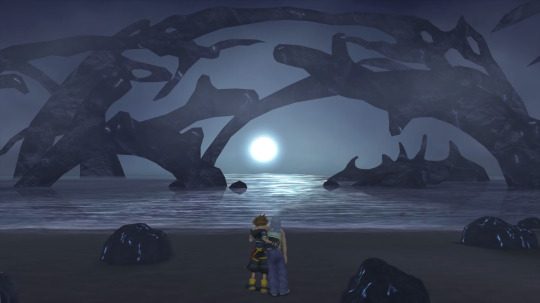
[Image Description: Sora supporting Riku as they walk toward the ocean on the Dark Margin at the end of Kingdom Hearts II. End Description.]
As mentioned in my earlier analysis, this narrative framework emphasizes the importance of balancing contrasting attributes, which fits in extremely well with Kingdom Hearts’ focus on balance between light and darkness. For stories that follow the Heroine’s Journey in a visual medium, that dichotomy is often incorporated into the characters’ look. Height differences are common, while their color schemes and outfits are designed to make them complement each other. Further adding to the focus on balance between light and darkness, the visuals of the story frame the romantic leads with imagery associating each one with light or darkness to create Yin-Yang symbolism when they are finally in balance.
In Re: Chain of Memories, Vexen openly calls Riku the “Hero of Darkness[3]” as a counterpart to Sora’s role as the “Hero of Light”, and their combination attack in Kingdom Hearts II utilizes moves that reflect both elements. In the Ultimania for the original game, Tetsuya Nomura said that Riku’s look was intentionally designed to balance Sora’s[4], and the contrast between their respective color schemes is maintained in each of their new outfits. In Kingdom Hearts II and Dream Drop Distance, Riku wears white and blue, while Sora in those same games wears black and red. Two different pairs of contrasting colors. Kingdom Hearts III has them both in outfits that are primarily black and grey, but still emphasize the blue and red that have been part of their respective outfits since the first game.
In a Heroine’s Journey, the love interest is typically an active character in the story and usually serves as the deuteragonist. This fits with Riku having been a mandatory playable character in multiple games since 2004. In addition, series producer Shinji Hashimoto said before the release of the HD 1.5 Remix collection[5] that the main focus of the series is how Sora and Riku develop both as individuals and as a pair, which fits with how the central conflict of the Heroine’s Journey revolves around the dynamic between the Protagonist and their Animus.
A common viewpoint held by many fans of the series is that Kairi is Sora’s love interest, and it’s not hard to see why people get that impression. He has sacrificed himself to save her in two separate games now. He’s charged enemies head on in order to rescue her whenever she’s been captured. He even got down on his knees and begged for her freedom when Saix demanded he show how important she was to him. Multiple characters have talked about how special she is to him, and Roxas refers to her as “that girl he(Sora) likes.”
However, there are multiple elements in the narrative that point to them not being the endgame romance. Kingdom Hearts III foreshadows the final shot of them sitting on the paopu together at the end of the game with Sora disappearing from the cover of the 100 Acre Wood storybook, textually framing Winnie the Pooh as a parallel to Kairi. While many fans regarded their sharing paopu fruits in the base game as the beginning of a relationship between them, he still only refers to her as a friend in Re:Mind, and even compares his bond with her to the bond between Ventus and Chirithy.
Sora also does not treat his promises to her with the seriousness he would if they were going to end up together. The promises to return her lucky charm and to come back to her that he makes in the first game are never treated as anything urgent when he awakens in Kingdom Hearts II. Instead, he declines the opportunity to return to the islands and check in with her in favor of searching for Riku. When Kairi says in The World That Never Was that they’ll be together every day, Sora agrees, yet he was content to spend the rest of his life on the dark beach at the end of the game as long as he was with Riku.
Meanwhile, the most consistent theme regarding Kairi in relation to the Destiny Islands trio is the idea of childhood friends drifting apart as they get older[6][7]. This is particularly highlighted in Kingdom Hearts III, with Kairi writing letters to Sora that she never sends, thereby keeping her thoughts to herself. Merlin also emphasizes this when he talks about forging new connections after Sora’s visit to 100 Acre Wood. This parallel frames the ending of Re:Mind as the two of them recognizing they’ve drifted apart and choosing to put in the effort to renew their friendship by spending time together.
On a structural level, her portrayal does not fit with how love interests are typically depicted in the Heroine’s Journey, both as an individual and in relation to the main protagonist. There is no contrast between her and Sora’s designs or roles the way there is between his and Riku’s. Her color scheme is predominantly pink, which does not have the same contrast with Sora’s red as Riku’s blue. Because she’s a Princess of Heart, there is no dark and light contrast, and the combination attack she shares with Sora in Re:Mind only utilizes light-based moves. It took 17 years after her first appearance in the series for her to be made a playable character, and even then, playing as her is not mandatory. They are never portrayed as equals, and she is not an active force in his emotional growth.
The Heroine’s Journey was crafted for narratives revolving around identities that have been Othered by society for one reason or another. Murdock designed her template as a tool to help women deal with being shamed by society for expressing and pursuing their desires. In a similar way, LGBTQ+ people also face stigma from society for expressing and pursuing their desires. So it makes perfect sense that a framework for narratives of people overcoming internalized stigma against important parts of themselves would be ripe for stories featuring LGBTQ+ protagonists of any gender.
As mentioned in previous essays, stories that follow the Heroine’s Journey challenge the biases and blind spots of the audience. A relationship between Kairi and Sora does not challenge anything because she has largely been regarded as the endgame love interest by default since the beginning. Meanwhile, a romantic relationship between Sora and Riku challenges players to recognize heteronormativity within themselves and in the media around them. It challenges people to examine the lens through which they perceive the story and rethink how they look at what’s happening in the narrative.
In summary, the portrayal of Kairi and her bond with Sora is not consistent with how love interests are commonly depicted in the Heroine’s Journey, while the portrayal of Riku and his bond with Sora is. If Sora’s story is going to continue on this storytelling formula to the end, the structure of the Heroine’s Journey narrative leaves Riku as the only thematically viable candidate for the role of endgame love interest.
Now, as some people bring up in conversations about Soriku, there is a potential obstacle in the form of corporate executives. It is entirely possible that Disney will drag their heels and try to force the development team to downplay or remove any open same-sex relationship the series may try to depict. They do not have a strong track record of LGBTQ+ representation that isn’t a minor character who only appears for one scene. Given that their last IP to follow the Heroine’s Journey - the Star Wars sequel trilogy - crashed and burned at the end, executive meddling is my greatest fear for this franchise.
But the thing to keep in mind is that Tetsuya Nomura is stubborn as hell. One of the reasons the long gap between Kingdom Hearts II and Kingdom Hearts III was because he was holding out for permission to include Pixar movies in the game, outright refusing to start work on KH3 until they were given that go ahead[8]. If you want further proof of how stubborn he can be, this is how he described the meeting where he first pitched the series to Disney in a 2012 interview with the late president of Nintendo[9]:
Iwata: Their ideas were different from yours, naturally…
Nomura: Yes. They appeared to believe that we would make whatever they wanted us to make and came up with rather specific requests such as, "We'd like the game to feature this character." They were really excited, explaining their ideas... To be honest, though, I wasn't really interested in any of them. (laughs)
Both: (laughter)
Iwata: You wanted to borrow Disney's characters in order to make a new game that could compete with Mario 64, and you already had a vision of what this game would look like. I suppose their ideas didn't fit in with this vision.
Nomura: They didn't, no. In the end, I actually stopped a presentation halfway through. We didn't have that much time, and it looked like it was all going to get taken up by various Disney presentations. So, I interrupted them and told them the conclusion by saying, "I won't make such games."
Talk about nerves of steel. This man basically said “we do this my way, or we don’t do it at all” TO MOTHERFORKING DISNEY, AND. HE. WON. If there is any human being with enough force of will to make the Mouse House cave in and allow the depiction of an openly LGBTQ+ relationship in the Kingdom Hearts series, it is Tetsuya Nomura.
I cannot say with 100% certainty how things will go. But everything I know about storytelling patterns and narrative structure is telling me that Kingdom Hearts is a textbook Heroine’s Journey with a romance between Sora and Riku at its core. A relationship between the protagonist and the Animus does not truly begin until the “Integration” stage at the end of the Journey, and we are rapidly approaching the point in the narrative where the two leads traditionally become aware of and acknowledge their feelings in order to be on the same page for the finale.
Sources:
[1] “She-Ra's Noelle Stevenson Tells Us How Difficult It Was to Bring Adora and Catra Home” May 18, 2020
https://io9.gizmodo.com/she-ras-noelle-stevenson-tells-us-how-difficult-it-was-1843419358
[2] “Death of a Dark Youth, Desecration of the Animus”; December 20, 2018. https://www.teampurplelion.com/death-of-a-dark-youth/
[3] Kingdom Hearts Re: Chain of Memories. Square Enix, 2007.
[4] “A Look Back: Kingdom Hearts Ultimania Gallery Comments Part 1″; August 30, 2019;
https://www.khinsider.com/news/A-Look-Back-KINGDOM-HEARTS-Ultimania-Gallery-Comments-Part-1-15519
[5] “How Kingdom Hearts III Will Grow Up With Its Players;” September 24, 2013.
https://www.ign.com/articles/2013/09/25/how-kingdom-hearts-iii-will-grow-up-with-its-players.
[6] “E3 2018: Tetsuya Nomura on If Kingdom Hearts 3 Is the End of Sora's Story”; June 14, 2018.
https://www.ign.com/articles/2018/06/14/e3-2018-tetsuya-nomura-on-if-kingdom-hearts-3-is-the-end-of-soras-story
[7] “Character’s Report Vol. 1 Translations”; Jul 16, 2014
https://www.khinsider.com/forums/index.php?threads/characters-report-vol-1-translations.195560/
[8] “Edge Magazine Features Kingdom Hearts III Cover Story”; January 9, 2019. https://www.khinsider.com/news/Edge-Magazine-Features-Kingdom-Hearts-III-Cover-Story-14331
[9] “Iwata Asks: Nintendo 3DS: Third Party Game Developers, Volume 12: Kingdom Hearts 3D [Dream Drop Distance], Part 2: It’ll definitely be fun”; April 2012.
https://iwataasks.nintendo.com/interviews/#/3ds/creators/11/1
#kingdom hearts meta#kingdom hearts theory#kh speculation#kingdom hearts analysis#kingdom hearts and the heroine's journey#soriku
73 notes
·
View notes
Text
ON THE TROLL ROMANCES
Or Trollmances. Or maybe Tromances?
The most complicated, most hated, most beloved, most copied and most misunderstood of Homestuck’s narrative.
... And its the fucking Rommances.
Let’s talk about em.
I’m gonna break this down simple-like.
In Homestuck, each Player Species has a defined Romance. And we get introduced into this concept by the Trolls, who have Four and One Quasi.
Those four are: - Kismesistude - Represented by a Spade. Your Kismesis. A Black Romance, you are Pitch. Based on “Romantic Hate”, but the best summary is basically, Rivalry. - Matespritship - Represented by a Heart. Your Matesprit. A Red Romance; The You are Flushed. Typical Romantic Love. - Moiraillegence - Represented by a Diamond. Your Moirail. A Red Romance, You are Pale. Platonic Love. Basically, if being your Best Friend was a romance option. - Auspiticism - Represented by a Clubs. Your Aupstice. A Black Romance, You are Ashen. Pfft, I’ll get into this one.
Got that? Now we get complimicated. And we start with the basics and work up.

In Homestuck, Humans and Trolls have Romantic Love, and to Trolls, that Romantic Love is Matespritship. A Red Romance, where instead of “being in love” you are “Flushed” for your crush.
Red means Love, remember that.
Matespritship is a hotblooded Romance, a “Concupiscent”, which just means it tends to result in babies.
The Aspect that surrounds Matespritship is... well its Heart. It ain’t an original Romance, keep yer pants on.

Kismesistude.
Now we get complicated.
Trolls and Cherubs have Romantic Hate, and that is Kismesistude. When you are in the thralls of Romantic Hate, you are Pitched. This is the first example of a Black Romance, that is, a Romance that deals in the feeling of Hate, of Loathing, but having a specific Person of which you want to Hate and Keep Hating. Its like Love, but turned on its head.
Before you get your shirt in a twist, We all have felt this and seen this in action. Its called an Anime Rivalry.
Think Kaiba and Yami from Yugioh.
Or if you grew up in the nineties like me, a Pokemon Rivalry is Exactly this. No matter what you do or where you go, there’s always this one Asshole who just doesn’t quit, and you despise his guts, but gods do you love beating him at his own game.
That, is Kismesistude.
The Aspect of Kismesistude is Rage. - As indicated by the Spades Key being near the Kismesistude expert, Kurloz Makara. - By examining the wrathful Spades Slick, and all his various relationships. - By Being the object of Rage and in turn, Raging at your Rage-Crush. ... Like you want to literally Crush them.

Moiraillegence.
Trolls have Moirails. To them, a Moirail keeps them grounded, sane and is basically what I said: If being someone’s Best Friend was a Romance Option. This is the first of the “Conciliatory” Romances... which is basically, no baby making. If you are crushing for a Moirail, you are Pale.
Its like removing all the Romance part of Partners, but keeping all the affection.
In Anime Terms, this is the Best Friend Guy. Think Jonouchi and Yugi from Yuigoh
The Aspect of Moiraillegence is Blood. - Heart cares for Romance. Blood gives more a ship about You, and how You are doing. - Blood is a grounded and grounding Aspect. - Diamonds Droog (I’ll get into this one in a different post).

Auspticisism.
Trolls have Auspitices. They’re meant to get involved in the very passionate Romances, especially Kismesistude (but Matespritship can be just as needy) so that they don’t go Goku-Vegeta planet destroying levels of fuck-everything. If you are crushing for an Aupstice, you are Ashen. This is known as a “Platonic Hate”.
Pfft.
If you’re an Auspitice... You’re a third wheel.
That’s it, that’s the joke. This is basically if being a Third Wheel and a Cockblocker was a Romance option.
Homestuck made it all this hard to understand, mysterious rommance, when all you’re doing is being that one Anime Person that gets involved needlessly and pisses everybody off.
Its a Black Romance after all, that means its center is Hate in some form. So yeah, its more than likely built on everyone in the Passionate relationship hating your god damn guts for getting in the way.
However.
It also mixes up with being the Referee, or that one poor kid that runs into the blast of two majorly powerful cat pokemon and gets turned to stone for his efforts. Cos y’know, last thing you need is mystical magical fallout bullshit in your Pokemon anime.
The Aspect of Austpicism is Doom. - Cos damned if you do, damned if you don’t. - Consider that Trolls have Psychic Powers and Super Human Physical capabilities and have Gods and Monsters for Parent Pets. You really do need someone with a level head keeping an eye on that one Cobolt brat with the mindcontrol and the Yellow asshole with the omega-level holy-shit powers from blowing up the one planet capable of supporting and producing Troll Children. Cos if you don’t, the planet is fucking Doomed. - Or if you’re too much, you’ll end up dooming a relationship, cos the rivals or lovers just realized that there’s other fish people. This can be a good or really bad thing. So y’know, third wheel and all.
Now what I call the Quasi. Because its not a Romance, its called Friendship.
Y’know, the thing that can just intermix all this bullshit into one go and have nothing to really do with babies. Even the unknown Troll word for Friend also means Enemy.
And Homestuck spends the rest of its time showing you and asking you, just how far Friendship can go...
8 notes
·
View notes
Text
How to Make Powerful NPCs Interesting Again
We all know the trope: the powerful wizard hires the party to go run some minor errand, which inevitably leads to them stumbling onto the World-Ending Plot, which they have to solve, alone, with only the occasional advice from their wizened mentor. It's a trope as old as time; even Hercules got occasional boons from godly beings to help him on his quests. It's a great narrative device, until some player stops and asks, "If this wizard is able to stop time with a snap of his fingers, why doesn't he just stride into the field and shove a ninth-level fireball into the Lich's cranial cavity?"
This simple bit of cognitive dissonance can really ruin the fun and undermine the urgency of an otherwise great adventure. If the party knows that the only reason they're on this quest is because Randalf the Off-White can't be bothered to deal with the horde of undead outside his tower, it can make them feel like chumps or patsies, and undermine any sense of gratitude that comes later during the campaign's denouement.
There's a few simple ways to fix this, though: tricks that can help you, the DM, keep your high level NPCs while also explaining why the great powers of the world are relying on this band of scrappy adventurers to solve all their problems. Below are just a few.
The Balance of Powers
This principle is a great one, but is often sadly overlooked in many campaigns. Simply put, in the above example, the wizard mentor doesn't get involved not because he can't, but because doing so would bring in a whole host of other powerful beings that would complicate the conflict. Perhaps there's a council of archmages who have all agreed, for the sake of maintaining the fabric of reality, that they should keep their Ninth-level spells in their pockets unless they all agree it's necessary. Perhaps the BBEG has a patron on the Council, and the mentor can't interfere on his own without dragging his evil opposite into the campaign. This can actually make for a great part of the climactic battle: the mentor decides he can't stay on the sidelines anymore, and joins the fray, participating in an epic wizard's duel.
This can also be used with deities bestowing boons on the party: they can act indirectly by helping the party, perhaps because one of their rival deities is already helping the BBEG. Thus, the conflict of the campaign turns into a proxy war for a larger divine conflict that can't be fought, because it would annihilate all of existence. If you do take this path, make sure your NPC stresses to the party how essential it is that they solve this issue, because if the major players themselves join the fight, no one will survive.
The Protector of Reality
Similar to the Balance of Powers, this rationale places the Epic NPC in a conflict from which they cannot afford to divert their attention or resources, even for a moment. Perhaps there is a constant threat of otherworldly incursion for which they need all (or almost all) of their capabilities; after all, you don't want to be caught with your pants down and your spell slots expended when Tiamat bursts through the material plane like an alien parasite from a man's stomach. Even the threat of such an apocalyptic event would mean that, like a missile in a silo, an epic level NPC would have to sit dormant, never expending his magical capabilities because he never knows when they may be required. This is actually a great archetype to use for the Wizard in the Tower trope; they may have built themselves a convenient magical retreat at great cost because they couldn't afford the spell slot to cast Mordenkainen's Magnificent Mansion everyday, not while that same spell slot may be needed to banish an archduke of the Nine Hells. So, they sit in the tower, separated from the affairs of the world by necessity - but, still caring about the world and wanting to make sure it's not a shit place to live, they can find and recruit adventurers to handle the more mundane threats that don't shake the foundations of the universe. This is also a great twist finale to use on the party: perhaps the Wizard in the Tower joins them in the final boss battle, expending all his magical power -- only for, at that moment, the threat he's been guarding against for centuries to finally arrive, and now it's up to the party to stand against them where he cannot.
The Otherworldly Being
This works especially well with warlock patrons, but it can work similarly well with questgivers and friendly NPCs that have an otherworldly or spiritual bent. The key idea is that the force recruiting, motivating, and rewarding the players is not located on the material plane itself and is therefore unable to act on it; they need to find a local agent to handle the problem. There is plenty of inspiration throughout myth and folklore; dream visitations, whether by angels, fiends, fey, or Lovecraftian horrors, are particularly common as an impetus to get an uncooperative character to fall into line. There are more tangible methods of communication as well; perhaps they are a being of immense power that is trapped in every mirror in the world and needs an agent to eventually get them free, or perhaps they can only manifest through signs and omens that require interpretation. If you want to pull from Greek mythology, there's also the possibility of a dedicated oracle who acts as the voice of the gods, but gives only vague, ominous prophecies that won't reveal their true weight until later. In all cases, a clear distinction is established between the power of the questgiver and the limitations of their abilities to influence the mortal realm, making the party the ones with agency in the situation.
The Hidden BBEG
You'll want to be careful how you use this one, because you only get one shot to pull it off with a given group, and once the players suspect something it is really, really hard to recover from it. The basic premise is that the powerful NPC who recruited them, who sent them off to fight against the Big Bad Evil Guy, was secretly a villain themselves, trying to bring down their rival or clear the way for their own scheme. Think of Emperor Palpatine from Star Wars, sending the Jedi across the galaxy to deal with the Sith and the CIS, only to betray them all. Unfortunately this has become a major trope, and given how paranoid players typically are, it's very hard to pull off. There's a couple of tricks to making it work, and some of them may seem counterintuitive.
Do not make the Hidden BBEG perfect or flawless. Establish a set of motives for their actions, ones that may seem prosaic but also have a selfish bent. The high priest wants to rid the land of the evil king who is oppressing the population, but who is also stifling the priest's ability to build his church. The noble ruler wants to defeat the opposing empire that threatens the peace and stability of his lands, but also is motivated by revenge for the war crimes committed in the past. Create a pretext that puts them on the same side as the party, but a subtext that leaves the party slightly uneasy. If the party is concerned about their ally having selfish motives, they'll be expecting selfishness, even recklessness, but not duplicity and betrayal.
Do not reveal the full capabilities of the Hidden BBEG. If anything, they should appear to be about mid-level; capable, but not able to handle world-shaking threats. Most often they are hiding their capabilities until some final piece is brought into their grasp. One excellent example would be Fraz-Urb'luu, one of the demon princes of the Abyss, who is obsessed with recovering his staff of power; as a Hidden BBEG, he might pose as a friend to the party, waiting until they recover all the pieces and bring them to him before he strikes, showing his true might. Another excellent example is the Heirophant from the classic geek movie The Gamers: Dorkness Rising.
Show genuine conflict in the Hidden BBEG. Let them display passion and inner conflict, moments where they are troubled by the methods the party uses and the methods they and their followers are forced to use. There's an old adage that every villain is the hero of their own story; if you can make that ring true for your Hidden BBEG, to make the party invested in not just their cause but in maintaining their moral character, then the betrayal will hurt even more.
The Common Crowd
This might seem counterintuitive, but sometimes the best Epic NPC isn't epic at all, but just a collection of ordinary folk. If your campaign originates in a specific village or town, especially one full of colorful, memorable NPCs with personal ties to the party, then the collective needs and will of that settlement can become a questgiver NPC in its own right. The town is suffering from an unnatural drought? Send the party to seek out aid or a magical cure. The town is displaced following an invasion? Keeping the town safe and finding them a new home becomes a priority. This can also become a source of individualized side quests for the PCs; they're likely to be far more concerned about seeking out the rare medicine required to save the orphan girl who the rogue took under wing than they are about exploring a random tomb for loot drops. Plus, if the PCs invest their time and effort into protecting the town, it can make for an amazing final battle when the townsfolk come to support the party in battle, armed with everything they can get their hands on, ready to die for their heroes (a.k.a. The 'Mass Effect' Effect).
I hope these provide some good inspiration for your campaign! Let me know if there's any tricks you've used on your campaigns that worked particularly well, or any that you think should be added.
24 notes
·
View notes
Text
Mayday IS NOT a Mary Sue!
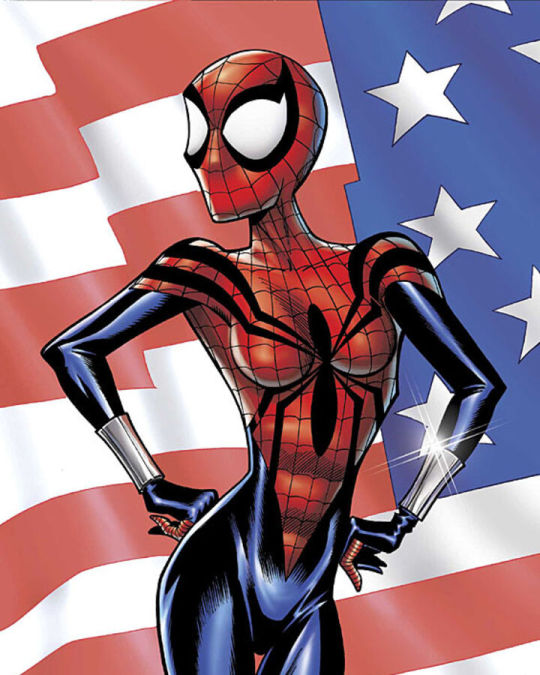
I’ve heard this assertion before and it’s just bullshit.
To tackle this topic I’m going to crank the dial up to ‘Very difficult’ and strictly look at Mayday’s debut in What If…v2 #105. Were I to take her entire character history into consideration the accusation would crumble like wet paper.
Now, there is no absolute definitive definition of what a Mary Sue is, though there are broad overlaps between the definitions. Those overlaps really boil down to an over idealized character/female character (the male equivalent is Gary Stu or Marty Stu).
For the purposes of this discussion (and because this is what I’ve seen the accusations revolve around), the idea of her being a Mary Sue hinges upon three key points:
She is not flawed
Everyone likes her
And
She masters her powers/wins her first fight with no difficulty
Let’s tackle them each at a time.
She lacked personality flaws?
Well she seemed a bit of a hothead, rather melodramatic and arguably (because she planned on returning to action) deceitful at the very end of the story. She also considered herself a freak and was upset that her athletic accomplishments were the result of her powers not her own hard work. And of course her sense of self was radically rocked when she learned her father was Spider-Man.
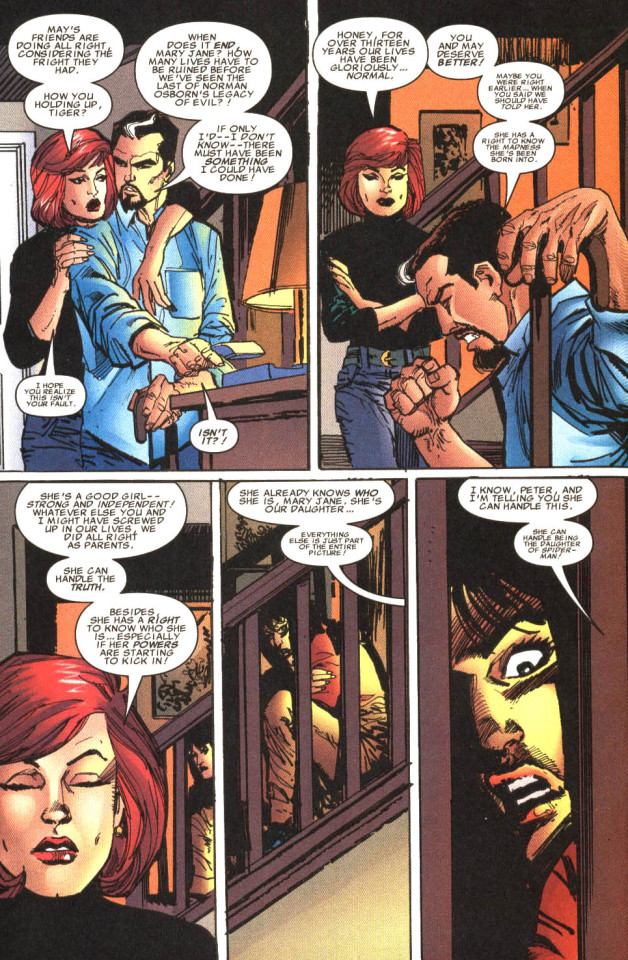

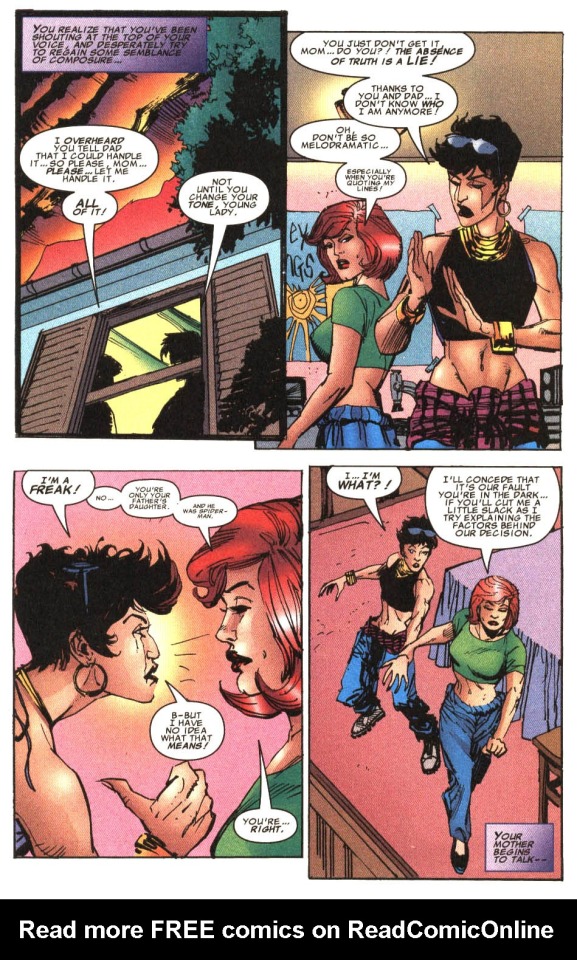

Whilst not a personality flaw per se, a source of contention in her life was that she didn’t fit in neatly with any of the school cliques. She was smart enough to hang with the nerds but also athletic enough to hang out with the jocks and as a result was forced to choose between them. This in turn hurt her romantic prospects the boy she liked, Brad Miller.
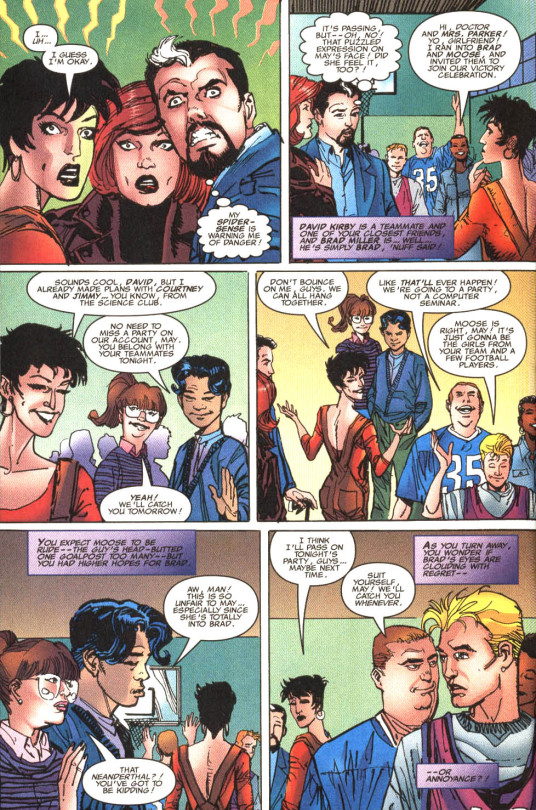

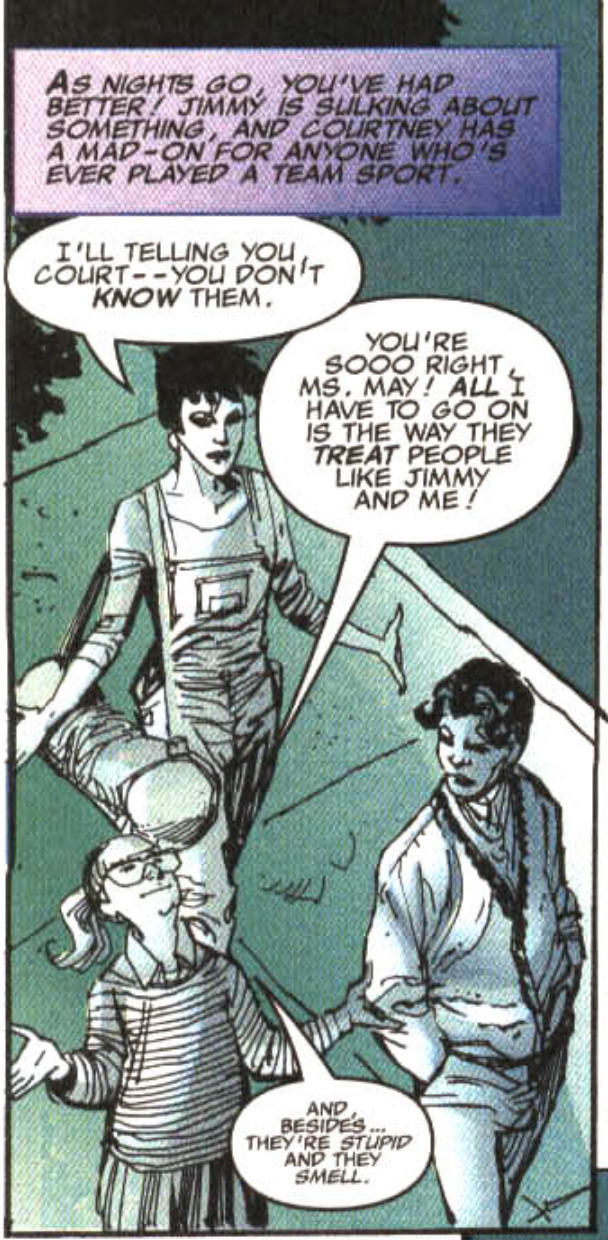
This is integral to the story because through her alter ego Mayday can combine her intellect and athleticism and be her truest self.
Ah, but does this not then reinforce the accusation that everybody likes her? Poor Mayday. Her problem is too many people like her. Cry me a river right?
Well, hold on a minute. Why is the idea of people liking the character a mark of a Mary Sue in the first place? It can’t just be a realism issue as many characters can be celebrities or beloved public figures. Bruce Wayne (out of costume) and Wonder Woman are beloved by most of the general public. So is Thor, Captain America and arguably Tony Stark and ¾ of the Fantastic Four.
Obviously villains dislike them though. In this vein then Normie Osborn in What if v2 #105 would dispel the accusation. But let’s be honest, that’s a little cheap isn’t it? Obviously villains aren’t going to like the hero, they wouldn’t be effective villains if they did *glares at Kylo Ren*.
So why are those characters not regarded as Mary Sue’s then? Well, the simple answer would be that the general adoration from others isn’t really that big of a deal for most of those characters. The general public do not strictly speaking need to like the F4 (and in fact have vacillated in their opinion of them), they just need to be famous.
In contrast Spider-Man had a poor public reputation due to Jameson and this is regarded as a hallmark of the character. It’s such a hallmark that it made it into the first 2 movies and later in Spider-Girl the fact that she had a far better public image was highlighted more than once.
So what’s going on here?
Well basically a character is a Mary Sue when everybody loves them at it either serves no story purpose, or if it’s a cheap way of conveying how much the audience should love a character. Or if it makes the character’s lives easier without them putting any work into it.
To give you an example from anime Son Goku and Usagi Tskunio (from Dragon Ball and Sailor Moon respectively, two of the most popular anime ever) typically made friends easily and even converted enemies into allies more than once.
Does this make them Mary Sues?
No, because the people who became friends or allies didn’t just immediately or easily evolve into those roles. Work and effort was put into that by Goku and Usagi respectively. They endured pain or displayed bravery or sacrifice or put their hearts on the line to convince someone to bet better
Now, I’m not saying Mayday’s popularity came about through methods like that. We do not know how Mayday became as popular as she is, though we can easily infer it’s due to her athleticism, physical attractiveness and brains. She’d fit into multiple cliques in school so it’s not unbelievable that her company would be desired by them.
What ultimately disproves her as a Mary Sue in this regard though is that there is a price to pay for that popularity. She is forced to choose between the groups and thus undermine friendships with one group or another. And she can never fully be herself…until she becomes Spider-Girl that is.
Basically Mayday being popular doesn’t make her a Mary Sue because it comes at a personal cost. Her life would honestly be easier if she was just a jock or a nerd.
Of course the counterpoints to that are that it’s a pretty minor concern all things in the grand scheme of life. And if she brings those two halves together as Spider-Girl then she’s solved her problem hasn’t she?
Well for starters, not fitting in exactly with any one group, undermining one set of friendships due to servicing another, juggling those social circles?
That might be a piece of cake next to what Peter Parker dealt with in high school, but for many teenagers it is actually pretty important.
In much the same way that scale matters in super powered conflicts, scale matters in terms of emotional conflicts too. We might argue May has it easier than Peter, but Peter had it arguably easier than the X-Men, or the Silver Surfer or ben Grimm. This is why his romantic or financial struggles were as compelling as (if not more so than) those of the Avengers efforts to save the world.
Mayday is 15. She is growing up. She is still figuring out who she is. So yes, her place in the high school hierarchy (especially in 1990s America no less) and social situation would be important to her. And it is she who is ultimately our POV character.
As for the second point about the two halves of her lives, it’s true. Mayday’s emotional conflict of being pulled between two groups reconciles by the end of the story because she bridges the gap. But for starters, let’s remember Mayday was designed to be a done-on-one character with merely the possibility of a continuation. So reconciling her emotional conflict by the end of the story makes a lot of sense narratively. However, the reality is when she became an on-going character it really wasn’t a big deal.
This is because, whilst she bridged that gap as Spider-Girl, she can’t be Spider-Girl ALL the time!
She has to at some point take the mask off ad go to school and in that environment she still needs to juggle not seeming nerdy to the jocks but not seeming like a jock to the nerds. She would still need to sacrifice potential romance and team building experiences with the jocks or sacrifice arguably more substantial friendships she’s held since childhood.
Okay, so being liked by everyone in context doesn’t render Mayday a Mary Sue.
But surely we cannot defend her fighting prowess? In her first ever encounter with a villain, her first ever fight, her first ever use of the webshooters she won, and seemingly didn’t stumble.

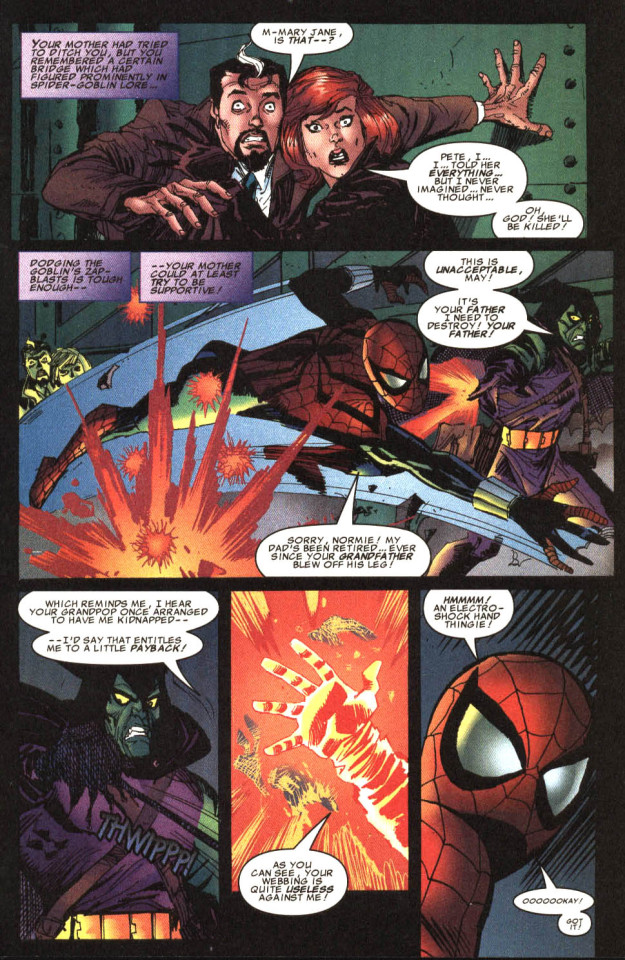
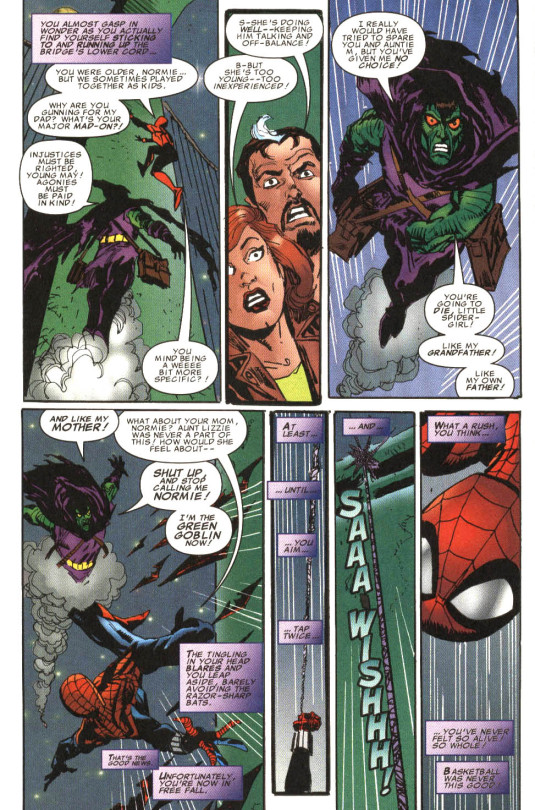

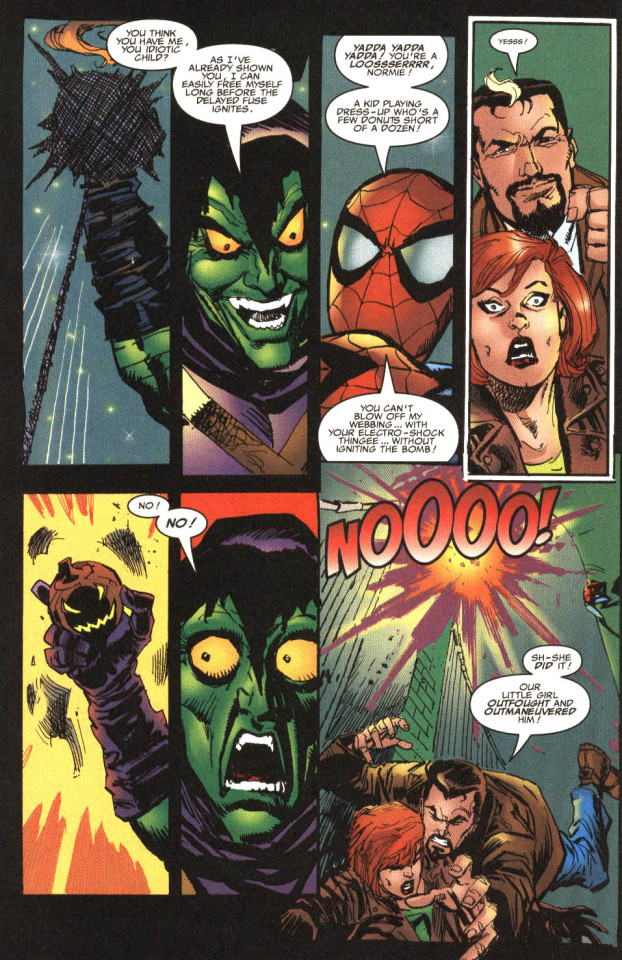
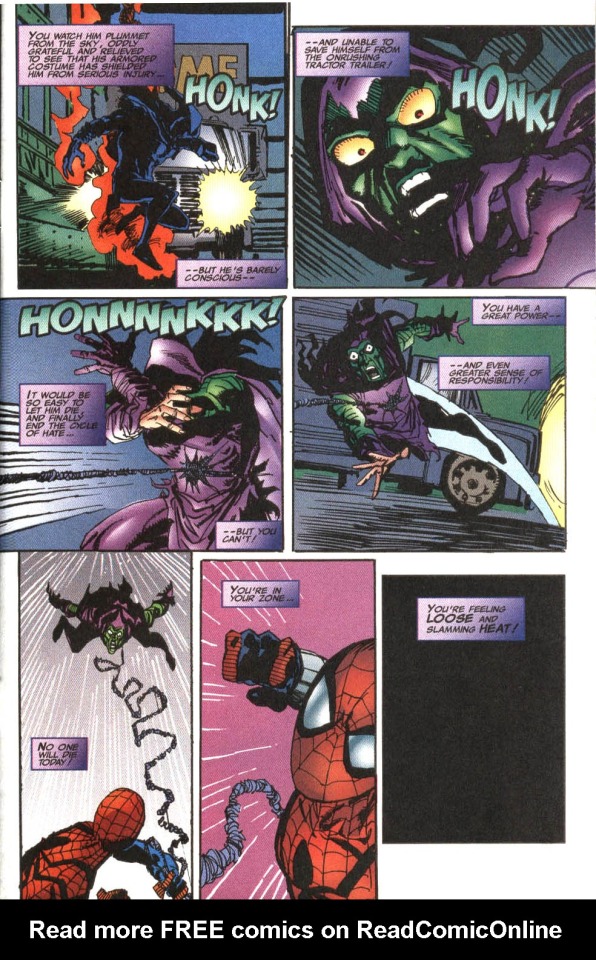
How can this be defended? Isn’t that at least approaching Rey from the Star Wars sequels levels of unearned skill?
First of all, May should be graded on a curve for the simple reason that she wasn’t invented to be strictly speaking an on-going character. Her whole character arc might’ve begun and ended in What If v2 #105 so given the story, of course we weren’t going to see a training montage.
But even if you ignore that the accusation doesn’t really add up.
For starters it’s pretty obvious her opponent (unlike Rey’s rival, Kylo Ren) was not overly experienced. He seemed to know how to use the weapons in his possession but was clearly emotionally unstable seeing as he was beaten by such an obvious way.
May’s internal thoughts throughout the fight also make it clear she is mostly winging it. She isn’t fighting as effectively as an experienced Spider-Man against an experienced Goblin. She is mostly riding on instinct and her strategy, whilst ultimately effective, is also very rudimentary.
She spots Normie’s gloves are capable of an electrical discharge when she webbed up his hand.
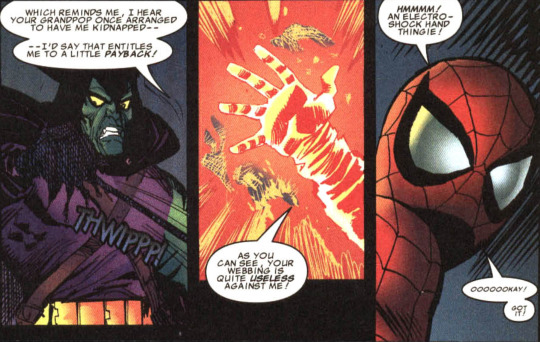
She knows he uses pumpkin bombs because she saw one when he attacked her earlier; plus it’s likely someone just knows about such an infamous super villain.
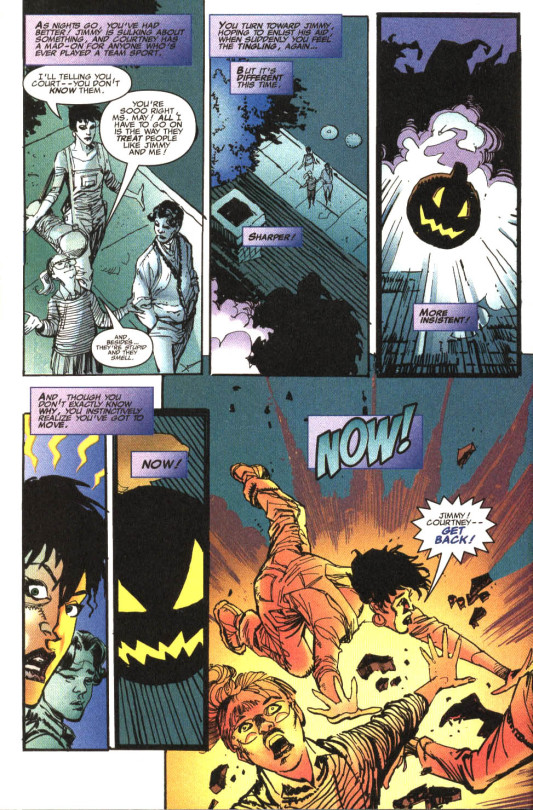
So she waits for him to pull out a pumpkin bomb then webs up his hand again, hoping he’ll react by using his discharge and blowing himself up.
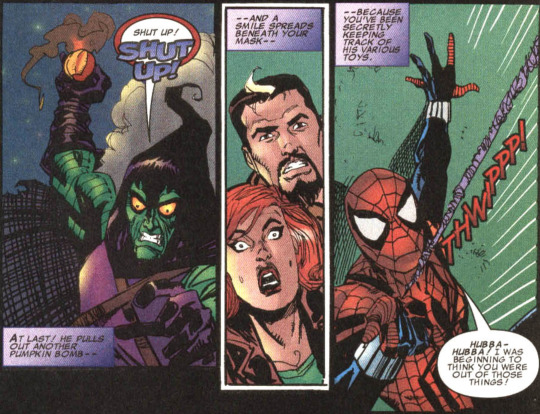

Amidst this she needles him to make him emotional and throw him off balance increasing the chances he’ll use his best weapon (the pumpkin bomb) and not think through his actions.

Let’s also consider she webs up the same hand twice, which would make Normie consider his reaction even less.
It’s a basic but it got the job done. Mayday wouldn’t have needed to be a genius or an experienced fighter to have come up with that plan.
But as it happens her parents are two people who between them have scientific acumen, strong social skills, a penchant for getting inside people’s heads or under their skin and are very quick witted and resourceful. It’s not really necessary for the story to spell out for us that Mayday could have inherited these traits and/or observed them in practice growing up.*
From a storytelling POV, because we the audience are familiar enough with Peter and MJ (even if you don’t know that many specific stories) that context is part of the subtext of the story. So Mayday possessing those essential skills isn’t a cheap ass pull or anything.
But what about her use of Peter’s powers? She didn’t stumble with them, not even once.
Well, putting aside how the narration makes it clear she’s riding by the skin of her teeth more than once, this is justified when we compare to Peter himself.
I know that in Spider-Man 2002 and Amazing Spider-man 2012 Peter practiced with his powers and did stumble a bit in his use of them. But those were live action movies that demand a certain greater degree of realism because we have actual human beings right in front of us. They were also made 4-14 years after What If v2 #105. Additionally, whilst Maguire and Garfield’s Peter’s did have to stumble a bit, the key phrase there is ‘a bit’.
They got the hang of their powers pretty quickly, with Maguire’s Peter trouncing Flash Thompson with ease.
youtube
Garfield meanwhile defended himself from people in a tiny subway carriage practically by accident.
youtube
Maguire’s Spidey got the hang of web swinging on his second try.
youtube
For the original 616 Peter Parker, the situation was even easier. IIRC aside from one flashback story showcasing Peter accidentally failing to control his strength, Peter had a handle on all his abilities pretty quickly, including web-swinging. Very early into his career he held his own against four experienced heroes simultaneously. Specifically the Fantastic Four.
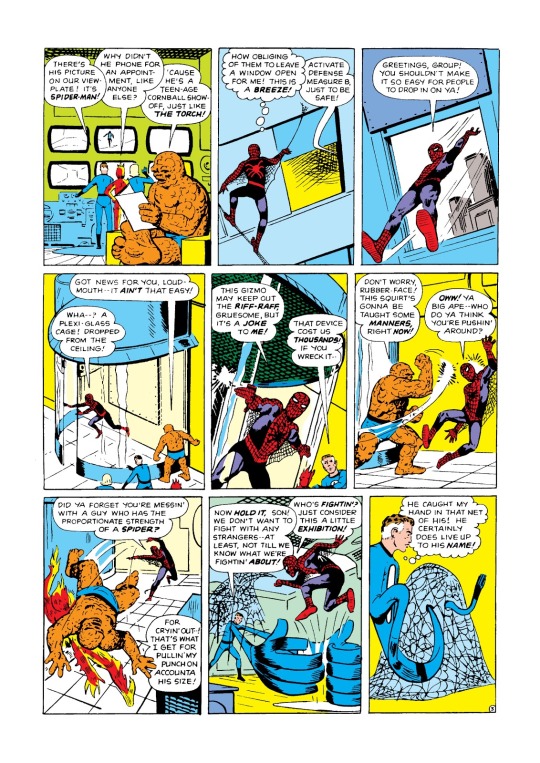
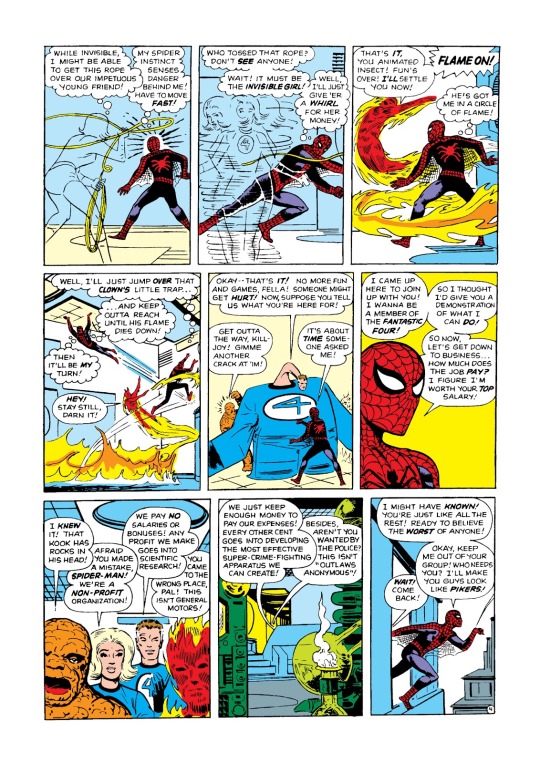
This was (in publication order) the first ever time Peter battled anyone with powers of their own. And remember, this event is 100% canonical to Spider-Girl’s universe. Her version of Peter Parker (her father) battled the F4 exactly this way.
Ah, but that was written in 1963. Standards weren’t as believable or grounded as they were circa 1998. Well, what about Ultimate Spider-Man from 2000? A series that was actually bucking trends because it was more grounded and realistic (allegedly)? In this universe Peter had his powers for a while before he first ever super villain battle and had dealt with some petty crooks before.
Nevertheless he too was very effective when he first fought Ultimate Green Goblin. Ultimate Goblin wasn’t great at critical thinking, but he was overwhelming stronger than Peter and more durable. And yet, Peter at the very least held his own in the fight.
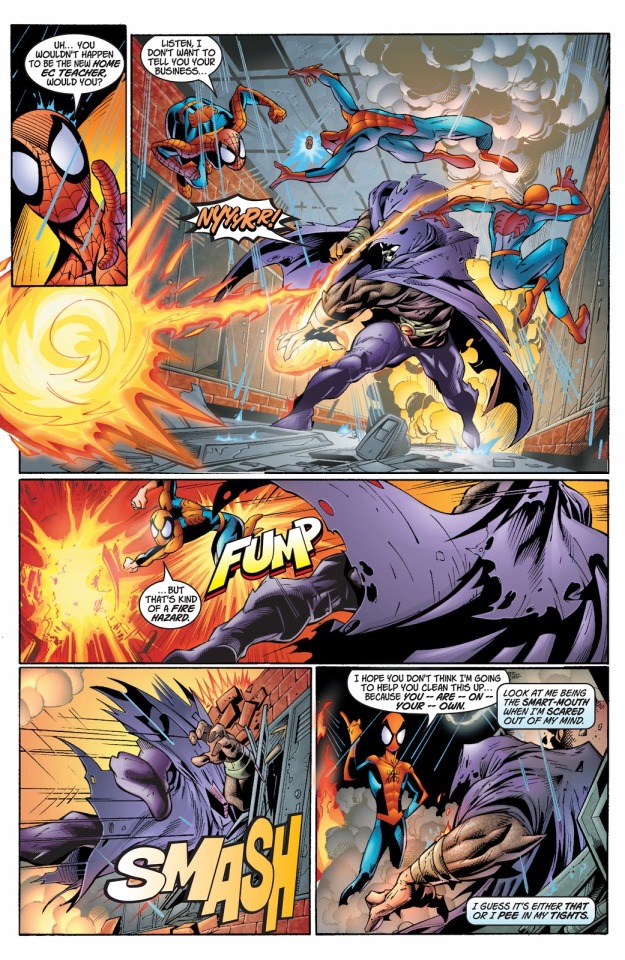
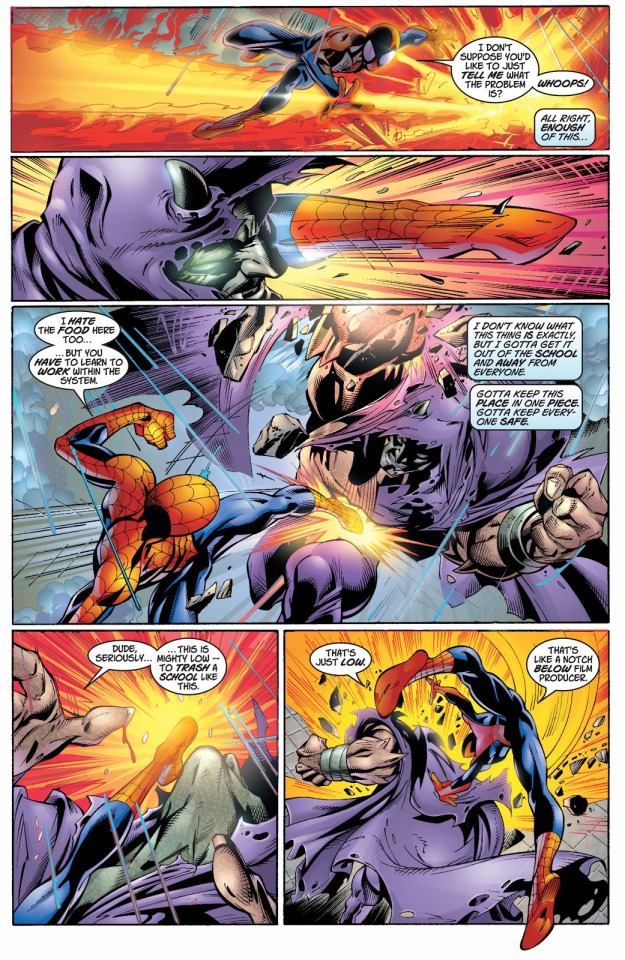

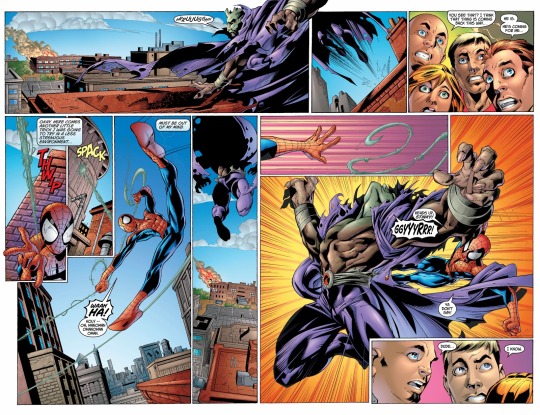
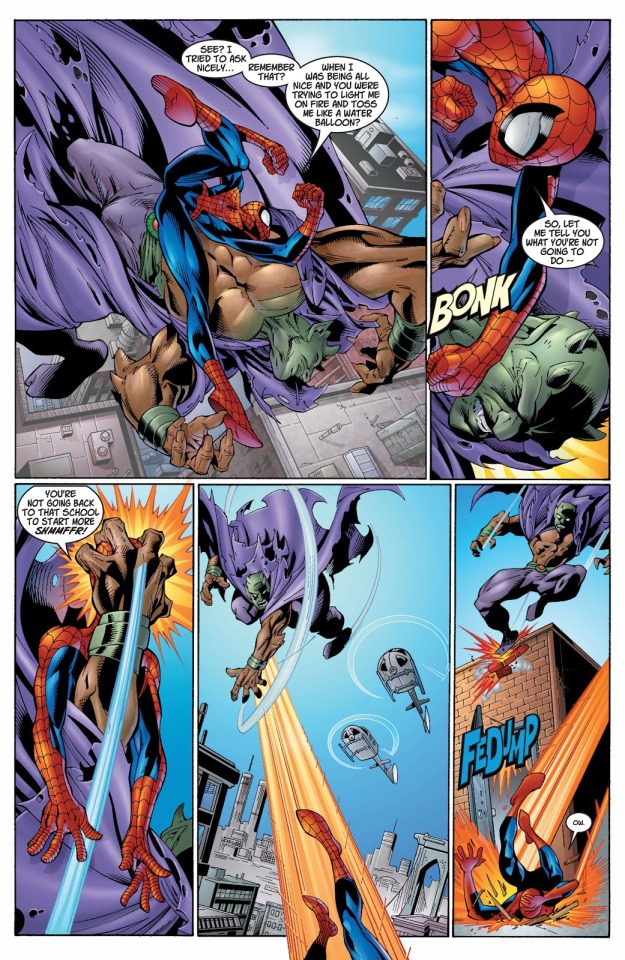
So it seems spider powers don’t require much practice before you can use them in combat. You can at least avoid attacks, hold your own and grasp the basics of web-swinging pretty quickly.
When looking at the 616 version of Spider-Man’s (and by extension Spider-Girl’s) powers this makes a lot of sense.
To begin with wall-crawling was second nature to Peter in the 616 universe and Ultimate Universe.


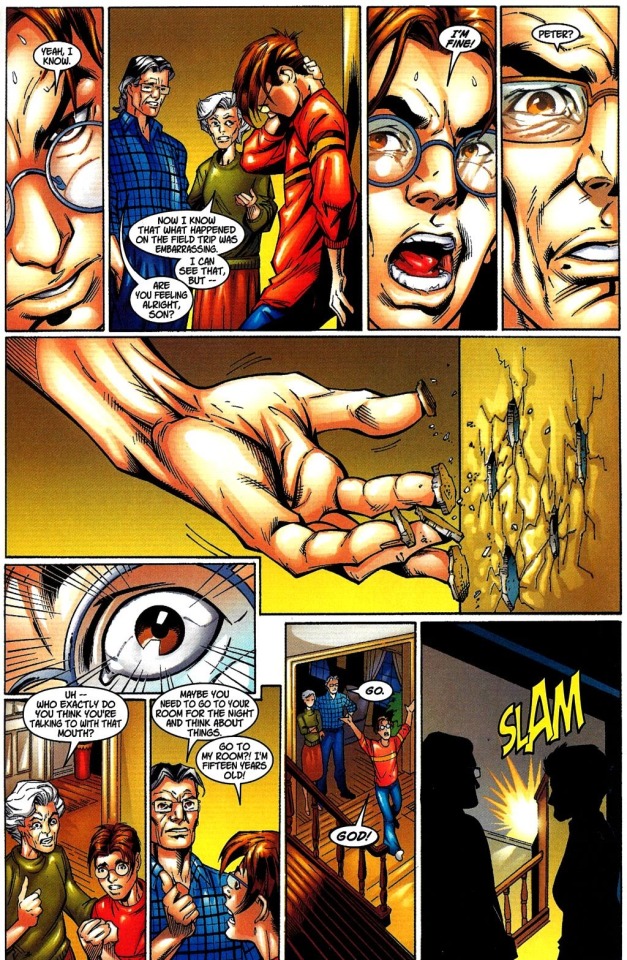
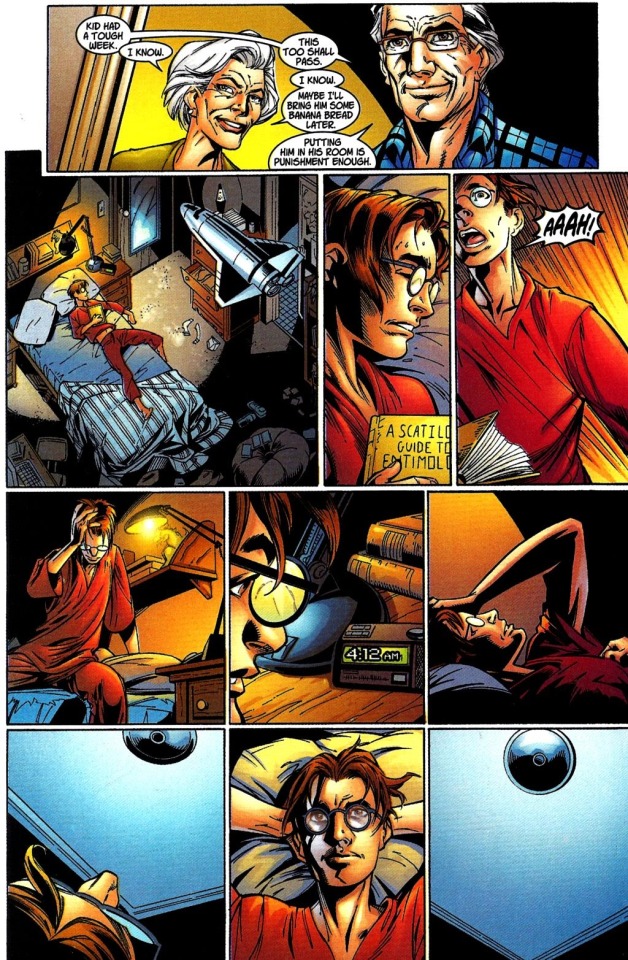

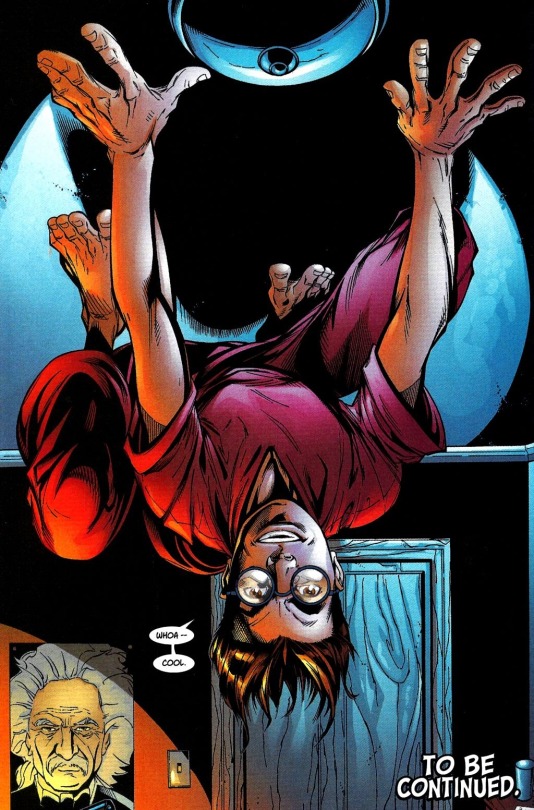
More importantly the Spider Sense is a MASSIVE factor in Peter and Mayday’s respective fighting styles and was explicitly a factor in Mayday’s duel with Normie.
The Marvel wiki had this to say about Peter’s spider sense on his main page:
Spider-Sense: Spider-Man possesses a precognitive danger or "spider" sense which warns him of potential or immediate danger by the manifestation of a tingling sensation in the back of his skull, and links with his superhuman kinesthetics, enabling him to evade most any injuries, unless he cognitively overrides his automatic reflexes… Spider-Man's spider-sense is directional and can guide him to or away from hidden weapons and enemies. Sudden and extreme threats can cause his spider-sense to react with painful intensity. Spider-Man can also sense and dodge attacks directed randomly or by an artificial intelligence. Using his spider-sense to time his enhanced reflexes, Spider-Man can casually dodge attacks up to and including automatic-weapons fire, provided there is sufficient distance. His spider-sense is sufficiently well-linked to his reflexes to the point that a threat can trigger them even when Spider-Man is asleep or stunned.
This is further corroborated in ‘The Amazing Spider-Man: The Ultimate Guide Updated Edition’, written by Tom DeFalco, co-creator of What if v2 #105
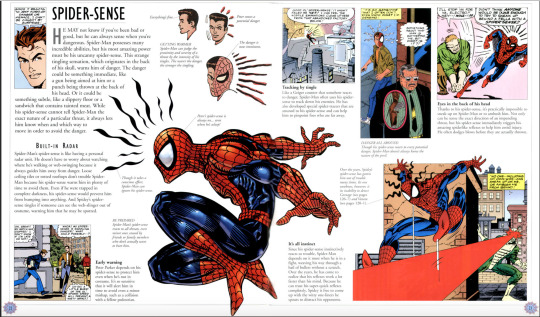

Additionally, ASM #656 established that Peter’s Spider Sense helped him greatly when web-swinging by subconsciously guiding his aim towards safe anchor points.**
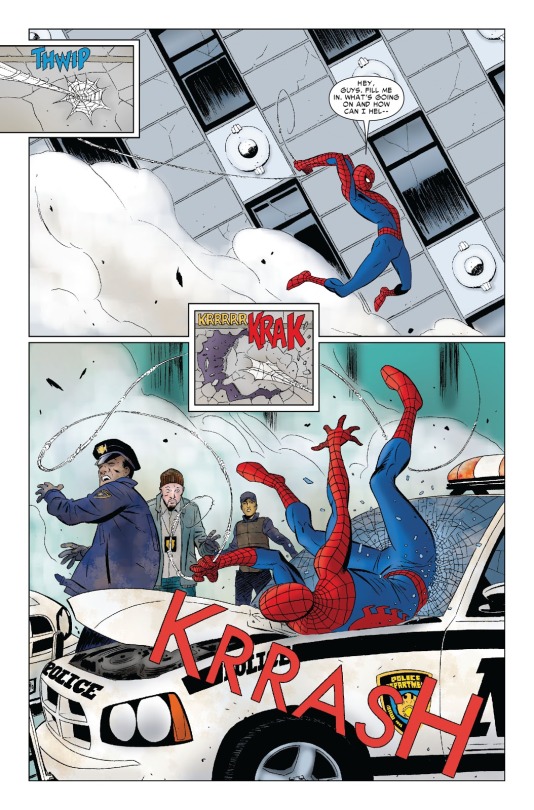

So Mayday’s proficiency with her newfound powers is actually not all that surprising. Her Spider-Sense actively compensated for her lack of experience. And if we look at her battle with Normie her predominant tactic is to just dodge and keep him distracted. The latter doesn’t really require training just some common sense and guts. The former is practically the wholesale function of the Spider-Sense in the first place.
Still don’t buy it?
Still think this is all a stretch?
Think that the Spider-Sense is just cheating?
Maybe you think dodging is one thing, but Mayday actively attacks Normie three times in the battle.
She saves herself from freefall and then transitions that into a strike against him.
She webbed up his hand accurate in the midst of the fight twice!
Her ability to do all that in her first fight, with no training, surely proves her for the Mary Sue she is.
Well here is something even I never considered until today…Mayday was already athletic before she gained her powers.
Mayday had won herself a spot on the Midtown High girls basketball team.
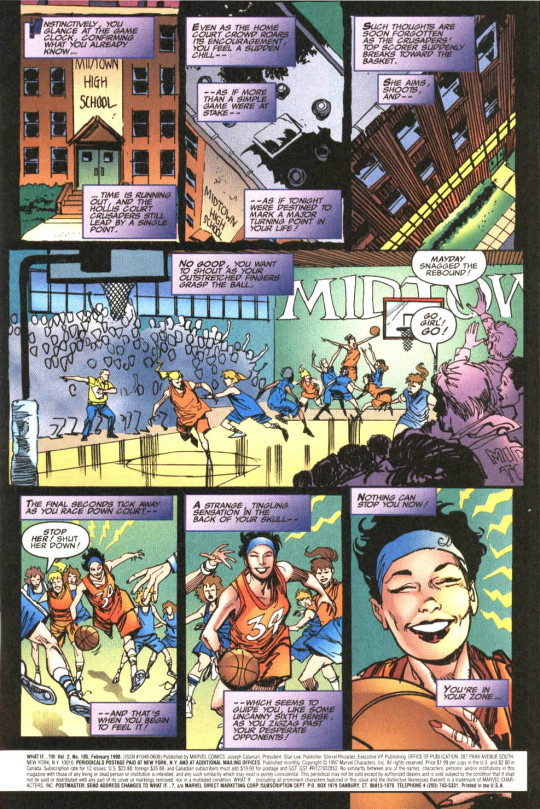

The story doesn’t say when this happened but her familiarity with the team and the popular kids not on the team heavily implies she’s been on the team for a while. She talks about possibly getting a shot at scholarship or going pro. This again implies basketball isn’t just a recent new hobby, that she’s been into it for a while; an idea confirmed in her on-going solo book. This is further alluded to when Mayday laments that she believed her athletic skills were the result of training, practice and hard work.
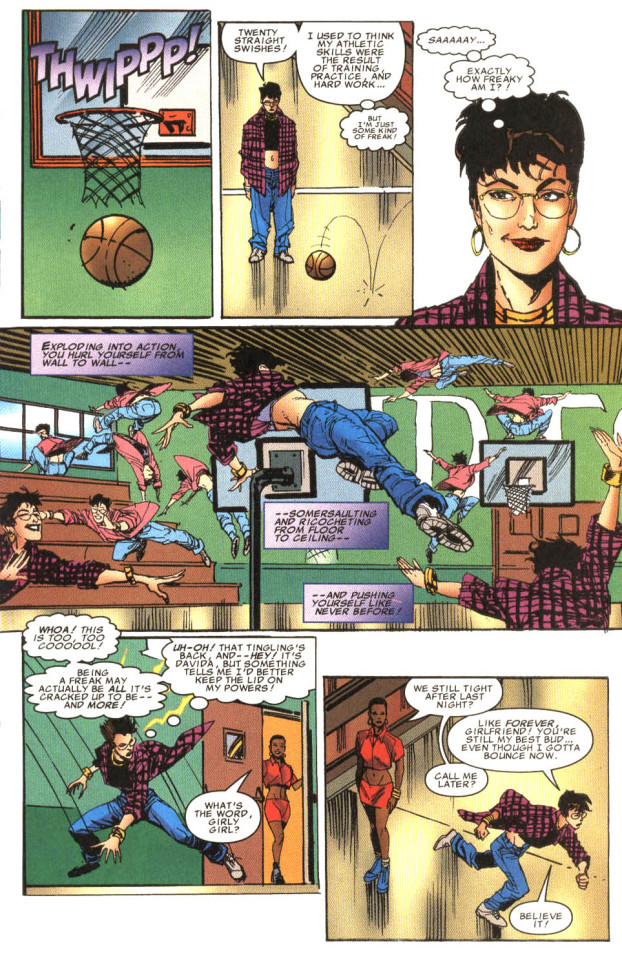
That line itself implies Mayday has in fact had her powers all along and been unwittingly been using them. This would mean that Mayday had been practicing on the court for many years, giving her a handle on her skills that she could bring to bear against Normie.***
However, earlier in the story Peter and MJ have a shocked reaction to Mayday’s slam dunk. Along with their dialogue this implies Mayday actually didn’t have any powers before the start of the story.

Regardless, if Mayday trained, practiced and worked hard as a basketball player (and was good enough to make the team) she’d have developed certain skills. Skills that would have been transferable to her duel with Normie.
She’d have developed hand-eye co-ordination. Hence her ability to aim her webs and strikes accurately.
She’d have developed an awareness of the physics of he body. As in what movements in relation to the situation would generate what result. Like for example when she transitioned her swing into a kick.
She’d have had a certain knowledge of basic physics, because she’d need the ball to go where she’d need it to go. As in if she pushes off left with her arms out she should travel X distance. If she curls up her body it will slow her down, etc.
She’d have developed muscle memory and been able to move on instinct. Hence she could still be great at dodging even without her powers.
She would’ve known how to observe terrain and her opponents. E.g. she knew how to use the bridge’s shape to create a pendulum motion and kick Normie. And she knew observed his electrical discharge attack and pumpkin bombs.
She would’ve learned how to use the terrain and her opponents’ strengths and weaknesses to her advantage. Hence she, you know…won the fight.
And she would’ve known how to perform under pressure. She wasn’t thrown off by her powers or Normie’s almost lethal attacks.
All of these factors would’ve served her incredibly well in her fight.
When taken all together NO.
Mayday Parker is not, and was never, a Mary Sue.

*Mayday’s scientific knowledge would also have served her very well in being able to figure out the right way to move in the battle. For example when she broke her freefall and turned the swing into an attack.
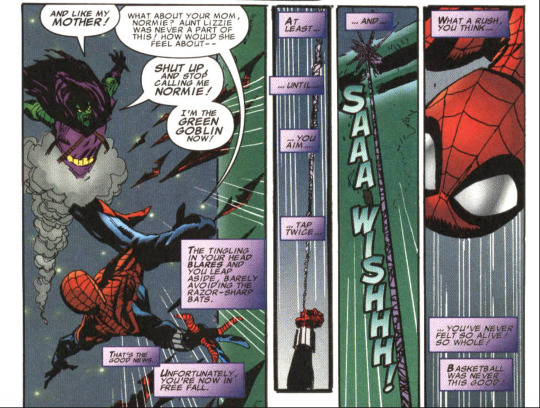
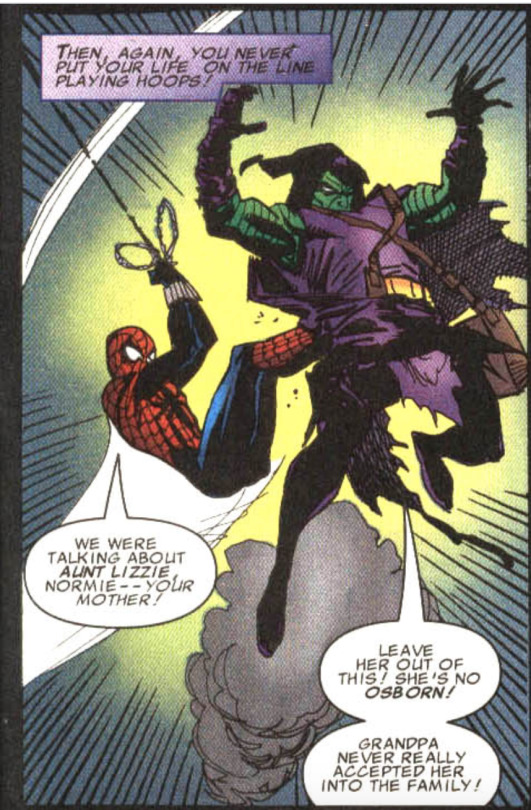
**We might also speculate it was the Spider-Sense that guided Mayday in how to use trigger the web-shooters through the double-tap mentioned in the story.
Although frankly Spider-Man being such a famous and well documented hero the general public have probably seen him shoot a web and thus know about his famous hand gesture. So Mayday, being intelligent (let alone scientifically clever like her Dad) probably deduced how to activate the web-shooters.
***Not to mention, the scene demonstrates Mayday testing out her powers. So she didn’t walk into battle with Normie completely unaware of what she might be capable of.
#Spider-Girl#Mayday Parker#May Parker#Spider-Man#MC2#MC2 Universe#Peter Parker#Tom DeFalco#Spider-Man 2002#The Amazing Spider-Man 2012#tobey maguire#andrew garfield#ultimate spider-man
37 notes
·
View notes
Text
TV Tropes and Crowley
There are plenty of narrative and character development tropes which could be ascribed to Crowley, especially after the cure-than-wasn’t at the end of the eight season of Supernatural.
During the final hours of the cure, with his soul on the verge of mending and his humanity being restored, Crowley experiences a Personal Horror (a trope in which a character is forced to see the horror of themselves and suffers from an alienation of self). His speech about deserving to be loved is its own variant on the Villainous Black Screen of Death (the heroes force a conscience on the villain and he suffers from the sudden overload of emotion and imposed morality). Though Crowley’s Oh God, What Have I Done (realizing the extent of the damage done) moment happens in between scenes, there is no doubt that it occurs, considering his questions to Sam about seeking forgiveness.
He might have had something resembling a Heel Realization (in which a character realizes they are a villain). Before the cure, Crowley was Neutral Evil (evil that serves only their own self-interests), and wasn’t interested in moral labels or concepts, only his own survival and advancement. The shock of the cure and sudden empathy – which requires some sense of the common good and thus morality – might have therefore led him to a version of a Heel Realization. It certainly resulted in Tears of Remorse in the form of a patented Winchester Single Man-Tear.
After the cure, Crowley was never again a typical Villain (surely no explanation needed), but rather found a balance between being an Anti-Villain (a character whose end goals are good – saving the world – but whose methods are monstrous or a character who is ultimately selfish, but will still do the right thing from time to time) and a Noble Demon (a villain who is noble, possesses a code of honor, fears being perceived as having “gone soft,” will save the hero from time to time, but still does monstrous things for their own ends).
It is increasingly obvious in the later seasons that Crowley no longer relishes his role as King of Hell, in the acquisition and torture of souls, or even in being a demon. He becomes a Tragic Villain (a villain that is aware that they are evil, but does not take – or no longer takes – pleasure in their evil deeds, even resenting being forced into the role of the villain). Damned to a hell of his own making by his past misdeeds and blood-born conscience, Crowley is also Trapped in Villainy (in which a reformed villain is unable to break away from the darkness due to external forces) out of fear that all of Hell will come after him should he abdicate. He also fears the loss of his amassed demonic power through Redemption Demotion (the lessening of the reformed villain’s powers to avoid ousting the heroes.)
Crowley suppressed his growing desire for human connection and redemption by considering himself beyond saving, declaring in his own way I’ve Come Too Far for there to be a way out of the dark. He may have felt this way both in that he was Beyond Redemption (where the hero – hello, Winchesters – declared the villain not worth saving), and succumbed to Sunk Cost Fallacy, believing that having damned himself and amassed all this power, he might as well use it for some semblance of good by keeping the demons in line and the world from ending - or else it’s all been for nothing.
And he certainly made (discreet) attempts at playing the role of the Noble Demon. In Season 9, Even though Crowley had self-interested reasons for turning Dean into a demon (other than, you know, saving him from death), he still empathized with Dean’s exhibited self-hatred as a demon. Demon!Dean avoids his own What Have I Become? moment (a post-human panic when a character is made less than human by becoming a monster or supernatural being), but Crowley surely knew Dean was suffering in becoming the thing the Winchesters had always hated and hunted. Saving Castiel in Season 9, attempting to stop Ramiel, hunting the Hellhound with the boys, fighting Lucifer – over and over throughout the later seasons, Crowley proved himself when there was A Friend In Need (in this case, the anti-villain or noble demon helps the hero, even though it might cost them).
Crowley’s relationship with his mother, Rowena, was understandably fraught with tension and complicated emotions. Had she not been so manipulative and self-serving in the beginning, it might have been a case of Even Bad Men Love Their Mamas (villains having a soft spot for their mothers), considering how desperate Crowley was for human connection and affection. Rowena’s abusive ways instead resulted in a Villainous Mother-Son Duo (a villainous mother uses her son as a pawn to further her own ambitions, is often verbally abusive, and the son often plots his mother’s demise).
What Crowley ultimately develops with the Winchesters and their angel is the relationship of True Companions (a found family of characters that may not like each other initially, but come to rely upon each other, with a bond deeper than friendship but not necessarily romantic). Teeth-Clenched Teamwork (enemies or former enemies being forced to team up for a common goal) eventually gave way to a Fire-Forged Friendship (enemies or strangers becoming fast friends through a shared experience of strife), particularly with Dean. By the end of Season 12, Crowley was on the verge of becoming One Of The Boys.
At the core of Crowley’s struggle was the reality that Hope is Scary (a character’s emotional numbness dissolves, allowing hope to be restored, but with it, the fear of loss and pain). What Crowley wanted – human connection, emotional depth, a fulfilling purpose – were all possibilities. Perhaps he could have made amends. Perhaps the Winchesters would have accepted him as one of them, given Crowley their trust and friendship. Perhaps he didn’t have to be a monster any longer. He could strive to be a better version of himself. But there was also the very real possibility that he would be rejected by the Winchesters, that he couldn’t become that better version. Crowley feared he might attempt redemption, only to realize he would never be worthy of it.
His fear of never being worthy or forgiven were confirmed by Sam’s Heel-Face Door-Slam (the villain attempts or openly desires redemption, only to be brutally rejected by the hero) in Season 10. In the face of this rejection, Crowley chose Then Let Me Be Evil (after being ascribed the label of evil by the hero, a character defiantly embraces that fate). And that might have been the end of Crowley’s road to redemption.
Instead, Crowley became the Friendly Enemy (a villain who shares significant emotional experiences with a hero, forming a lasting and profound connection that surpasses their initial hostilities). Crowley and the Winchesters often employed Enemy Mine (previous enemies or lesser rivals join forces against a greater threat) as a rational for this arrangement, and Crowley often got the shaft as The Friend Nobody Likes (just what it says; Crowley falls into the “Care” subset of this trope). Crowley’s continued involvement with the Winchesters could have be due to a Villainous Crush (a villain has secret romantic feelings for a hero). He hid his growing admiration and affection for the Winchesters and their angel through Insults of Endearment (Moose and Squirrel, respectively), and was unequivocally on the verge of a Face Realization (a character realizes they are no longer the villain they had been) and committing to a full Heel-Face Turn (a former villain openly joining the heroes).
So why didn’t that happen for Crowley? Because for some characters, Redemption Equals Death (redemption comes at the cost of one’s life). To make amends for his actions, save the world, spit in the eye of Lucifer, and finally earn the respect of the Winchesters, Crowley sacrificed himself at the end of Season 12. In an unusual pairing, Redemption Equals Death for Crowley was also paired with Death Equals Redemption (a character’s death redeems them in the eyes of other characters), in that the Winchesters spoke well of Crowley after his death, even including him in a prayer for restoration.
Crowley’s death was characterized by the Villain’s Dying Grace (a dying villain choses to commit a final good act, often saving the hero or the world), in that he died believing he was saving the world, protecting the Winchesters, sealing the rift, and locking Lucifer away forever in an apocalyptical alternative universe. He Faced Death With Dignity (a character takes control over their own death, faces it with dignity, and gives meaning to their final moments), even offering the Winchesters and Lucifer a final Dying Smirk (proving to have the upper hand even in dying) – even when I lose, I win.
Redemption Equals Death is a lousy trope. And lazy writing. Actual redemption is a long, hard road that involves emotionally difficult work, repairing relationships, shifting personal values, making amends. Living with what one has done, and attempting to be a better version of one’s self, is much more difficult – and much more fulfilling – than making a grand gesture and then escaping into death. Supernatural surely had its reasons for Crowley’s character arch culminating in Redemption Equals Death – Seasons 14 and 15 could be used to make the argument that Chuck was already having a hard time with Castiel being one of the boys, and didn’t want to add Crowley to the Band of Brothers (a group of people dedicated to each other before all other considerations). Death, however, wasn’t the only option for this reformed Villain.
Working with the Winchesters to close the Gates of Hell and join Team Free Will on a more open, permanent basis, Crowley could have transitioned from a Friendly Enemy into the Token Evil Teammate (serves as an amoral balance to the heroes, willing to perform unpleasant-if-practical tasks to save the world, and often employs snarkiness). In saving souls rather than damning them, and through the Power of Friendship (having friends makes you stronger than you are alone), Crowley might have discovered that being Good Feels Good (acting morally has its own emotional and social benefits). And he could have actively prevented the Winchesters from falling further into the trap of He Who Fights Monsters (a hero becoming the monster they seek to destroy through close association or behavior). Given his massive reserves of influence, expertise, finances and resources, Crowley most likely would have received a Redemption Promotion (an ineffectual villain discovers they are an extremely effective hero), earning his place among the Winchester’s Band of Brothers and reinforcing Good Feels Good.
That’s not to say that it would have been easy, or without complications. There would certainly have been some cases of Reformed, But Rejected (heroes refuse to believe the sincerity of a villain’s redemption arc). There may have been a case of the Enemy Within (a hero carries evil within themselves, which can rise up to control or influence them), as Crowley’s demonic nature clashed with his developing humanity. He might have worried about reverting to his more demonic self, and given Dean instructions to end him before that happens, as he would be better off Dying As Yourself (a final moment of control or being the good self before the corruption or evil takes over) - which Dean would gruffly refuse with Don’t Say Such Stupid Things (harsh reassurance of worth and affection). Crowley might have perceived his increasing humanity, and potentially the necessity of completing the cure, as Redemption Equals Affliction (villain is redeemed but suffers a meaningful loss to earn that redemption). After all, every one of the Winchester’s Band of Brothers suffer from some emotional anguish. In the end, it wouldn’t have mattered if Crowley became human or stayed a demon, so long as he was family, receiving the time-honored You Are Better Than You Think You Are (reassurance from other characters that one is good and making a significant attempt to be or remain good) from his True Companions - preferably in a Winchester-esque Chick Flick Moment.
As One of the Boys, Crowley could have been a gruff, snarky Atoner (a reformed Villain on a path of redemption, motivated by guilt and the desire to make the world – and themselves – better, and to utilize their powers and resources for good), combined with The Snark Knight (the world-weary, embittered, overly-intelligent and anti-social hero). Crowley may have chosen the path of the Ascended Demon (a reformed demon seeking the restoration of humanity) in obtaining the full restoration of his soul or his human nature. As an Ascended Demon (I prefer the term “risen” for Supernatural, to counterbalance angels “falling”), Crowley might even have decided to hunt down and kill – or cure – other demons. Regardless of how Crowley himself would have eventually come to define his own redemption and his place among the Winchesters, he would have stumbled headlong into being counted among The Fettered (those that believe in and serve a certain set of ideals or a moral code), committed to The Family Business of saving people and hunting things – if on his own terms and with the requisite amount of snark.
19 notes
·
View notes
Link
Two years ago, when reviewing “The Benedict Option”, I wrote, “Almost all Dreher’s critics accuse him of crying wolf or being a Chicken Little at best … Meanwhile, I’m saying that Dreher is underestimating his enemy, painting an overly rosy picture, and not being nearly alarmist enough.”
This is still true.
“Wait, what? Totalitarianism! Gulags!”
I know!
Let me explain; I promise hope, this will be shorter than last time.
…
First, Dreher’s critics, while still far too blasé and insouciant about the end-game-level crisis racing straight for them, have at least started to acknowledge that something’s happening here, what it is ain’t exactly clear, but that some greater degree of consternation and freak-out is now warranted.
But they are still far, far behind the power curve on this one.
As a friend of mine put it, “The single biggest problem is lag-seriousness. We are always just at best about grim enough for yesterday’s battle.”
That is where “Dreher’s Law of Merited Impossibility” comes from. “It will never happen, and when it does, you bigots will deserve it.” If it were possible, despite denials, and by pointing out a clear logical implication of progressive ideology – and even going so far as to supplement with the early appearances of those explicit proposals – to scare conservatives enough, early enough, to do whatever it takes to avoid it, then the impossible wouldn’t keep happening to them, over and over again.
But it’s almost never feasible to do this. It turns out this is the one impossibility. The frogs never jump out of the pot in time to avoid another scalding. The need is not to be grim enough for yesterday, but for today, so that tomorrow won’t bring your final sunset.
That puts Dreher in the position of a Cassandra.
…
In “Live Not By Lies”, Dreher seems to assume that something like faithful Christianity as we know it today is going to go through a profoundly difficult era of persecution, but still, its adherents having prepared for it, it will persist at some level despite intense suffering until, well, ‘deliverance’. Perhaps not in the Acts 12:3 sense, but then again, maybe so. How else?
…
That’s why even Dreher isn’t radicalized enough yet, because he doesn’t seem to fully grapple with the gloomy prospects for his tradition that is the clear implication of his own arguments about the overwhelming magnitude of the problem. That is: termination. Slow and steady and (mostly) gentle evaporation under the relentless heat of the sun until the last drop of water finally evaporates and the spiritual desert goes completely dry.
It would be like Travis telling the defenders of the Alamo that Santa Anna was sending a force in the morning that outnumbered them ten to one, that supplies were nearly exhausted, and reinforcements too far away to help. But with a tone of brutal optimism, “It’s going to be really rough boys, but if we’re tough enough, we’ll make it.” – “Um, rough? Well Travis, come hell or high water, I’m happy to make a stand and fight by your side. No rendirse! But to be frank, from the way you put it, I reckon it sounds like we’re all going to die.”
…
Now, before I explain why, let me get to the second piece of good news and commend Dreher for a wonderful second half of the book, which contained the inspiring and gut-wrenching stories of what it was like for people of faith behind the Iron Curtain to be the subjects of Communist anti-Christian oppression.
As I look over my notes, I see almost no comments or criticisms in that half. The testimonies speak for themselves. These harrowing and moving tales of triumphs of fidelity and perseverance in the face of the hardships and miseries of hard totalitarianism don’t need any gloss. The stories of these brave people deserve your study, and their memories your honor.
However.
What is both terrible and true is that a month later you are probably going to forget all their names, forget the details of their persecution, and come away with the same rough impression and vague understanding you already have. This is that Christians had it really bad in a place where Christianity was once all of life but had been evicted, that some of them nevertheless stayed devoted, and others gave the last full measure of devotion. Others resisted, and some of them even lasted long enough on the road through hell to make it through to the other side.
Though, in a way, it was lucky for them there was the other side: that didn’t happen everywhere. If the Soviets had then what the Chinese have now, likely there would have been no interviews or happy endings. You can’t even forget a martyr’s name if you never got the chance to hear about his martyrdom in the first place.
…
Alas, this is not really a manual at all, and regardless of whether Dreher is dropping some kind of Straussian signal with that, it’s surprising that few of his critics have noticed the problem.
An actual manual is more than just general rough guidelines; it has clear, specific, step-by-step instructions for how to accomplish some identified, well-defined task or troubleshoot typical problems. It cannot be a bunch of personal narratives, and, “Follow their lead; just be like them. Refuse to bend, like Benda.”
If one picked up, say, a survival manual, one would expect to emerge knowing how to start a fire and build a shelter. A beginner’s cookbook will at least tell you precisely how long to boil an egg.
What does Dreher tell us to do in an age of persecution? “Embrace Suffering.” “Choose a Life Apart from the Crowd.” “Reject Doublethink and Fight for Free Speech.” “Cherish Truth-Telling but Be Prudent.” “Cultivate Cultural Memory.” “See, Judge, Act.”
He doesn’t get much more specific. I think he believes he got more specific – “form small cells … read other books,” and the recitation of Solzhenitsyn’s Six Hard Rules on page 18 – but it’s not actually the case. “See, Judge, Act” is just a description of any rational decision-making process, and “Yeah, but this is Persecuted Christian decision-making,” doesn’t actually put meat on the bones. These are mostly motivation stimulants and abstract encouragements of the right general attitudes, but those do no a ‘manual’ make.
These are like ordering the military to “Be able to fight and win wars,” and then someone else develops the *actual* doctrine and writes the field manuals. These commandments, like the Decalogue itself, just raise a host of questions, “How much suffering? How far apart from the crowd? Which crowd? How do I identify doublethink? Fight for free speech how? Fight for hate speech too? Where is the line between prudence and paying so much lip-service I lose my soul?”
…
But how is some ordinary person who needs an actual manual supposed to live not by lies, if the famous, influential guy writing the admonition feels just as compelled by circumstances and prudence to live by omitting the lies?
There should have been at least one page that went like this:
You as a Christian are going to be strongly pressured to “wear the ribbon” and to say the following things which do not accord with the truths of our faith, and in order to live not by lies, you must be willing to sacrifice, suffer if necessary, and never say …
Never say what, exactly? Yes, integrity in general is a virtue, but obviously Dreher is talking about the Big Lies.
But in his book, there is a surprising paucity of actual lies. Isn’t that something? First it’s strange, then it’s puzzling, and then when you solve the puzzle, demoralizing.
My take is the answer to the puzzle of absence is Dreher’s actual manual, the one you are supposed to figure out. The most critically strategic task is to preserve precisely this kind of room for maneuver: the freedom to speak the truth and to condemn the lies. If you still can, if there is still some crack open in the window of opportunity, then you must band together and stop your opponents from being able to impose their rival orthodoxy on you, which forces that absence and omission and uses that dominance to call your lies truth and your love hate.
If you can’t do that, if you missed your chance to make that stand, then like the Alamo, it’s only a matter of time.
…
Otherwise, without the list of lies one lacks a clear idea of the threat one faces, and so vague guidelines are all that are left and there is no possibility of a manual with precise instructions. But with the lies, the enemy hears his own name like the aliens hear a scream in “A Quiet Place”, and then come down on you like a ton of bricks.
VI. From whence the cascade
Well, look, no sense getting some bricks in the face if one can avoid it, that’s just being smart and prudent. Though, inconveniently, it’s Dreher himself who quotes Milosz to argue against this kind of seductive logic.
Better logic would be to say that one can reason that the intended audience probably knows the lies already, and knows that they have been weak, acquiesced, and lived by them. They know what they are supposed to stand up for already, and they know they have failed to do so. They know who their enemies are, and they know they have failed to resist them. You don’t need to list the lies to send a signal to all these people that, by the very fact of this book existing, knowing that it is being digested by so many other people, they are not alone, and they can act differently.
But what the audience still doesn’t know is what to do about it. Dreher may not know either. Notice: a thousand Benedict Option startups have not bloomed. The Benedict Option was criticized as crazy and alarmist, but again, the ugly, gloomy truth is that it’s actually the hopeful, optimistic, and practically wishful-thinking take on things. Most likely, there is no such option.
…
The anti-audience already believes Dreher is far more of a kook and Chicken Little than his Christian critics do, and just a continuation of “The Paranoid Style In American Politics.” To them, Dreher can get in the back of the line behind the McCarthyists, “Eisenhower was a Commie!” John Birchers, QAnon conspiracy theorists, and low-status judgment-day-is-just-around-the-corner-all-the-signs-are-actually-happening prepper types. They are once again proclaiming the first half of the law, “It will never happen.”
And without the list of lies, their argument wins the day. It seems fully plausible and convincing. It sounds like this:
Oh look at these idiots going off again. Here we are, just trying to make sure love wins and hate loses. Our ‘radical ideology’ amounts to “Don’t be a bigot, help your fellow man, and keep your toxic hatefulness to yourself.” Everybody should be included, and nobody ought to be unjustly discriminated against. Simple, self-evident, human universals, really, do real, loving Christians really disagree so much with any of those? And because the white supremacist homophobes can’t think of anything else to say in response, the hide behind ‘Christianity’ as a pathetic rationalization for their simple irrational animus, and resort to inventing fantasies like gulags and torture rooms and KGB agents. Like *they’re* the victims! Delusional! What kind of creepy psychological problems do they have to really imagine that with all their wealth, comfort, freedom, privilege, and petty first world problems, that they are remotely spiritual kin with people who endured the worst suffering possible? Crazy!
Do you see the problem? It’s the ‘merited’ part of the law. Dreher wants to respond with the simple truth, “We’re not bigots, and we don’t deserve it.” The response would be, “Ok, let’s find out. What is it exactly that you are going to insist on believing or doing, that we would possibly think was worth throwing you into a gulag?”
He can’t beat around the bush with something general and evasive, “For being devout Christians.”
The response (at least from the rare one who knows anything about Christianity) would be as follows:
Look, we just think your religion is mostly a collection of mythological fantasies and superstitious prohibitions, but combined with a salvageable core of a worthy moral perspective that, like almost all ancient and traditional lines of philosophy, represents an incomplete and imperfect grasping toward the same ethical framework we now hold dear. That’s why Jefferson rewrote the bible, removing all those superfluous distractions. Following the actual bible seems kind of nutty and backward to us, but now that it’s in clear political retreat in terms of numbers and influence, and since most self-identified Christians don’t really seem to live like they take most of it seriously, we regard it as mostly harmless. So long as you keep it to yourselves.
So, nobody is going to throw you in the gulag for going to church. Or for believing Jesus is Lord, that he is the Savior of humanity and God’s only son, that he was born in Bethlehem of the Virgin Mary who in turn was immaculately conceived, that he performed miracles, made water into wine, multiplied bread and fishes, walked upon water, healed the sick, raised the dead, died for our sins, and was resurrected. That he saves his people by means of their repentance and confession to sin and commanded his followers to love each other and their neighbors and their enemies, and to spread his word and the gospel of the good news of their salvation to every soul.
Seriously now, is that not Christian enough or you? Are these not the central claims of Christianity? Is that not enough freedom to be a Christian?
And we aren’t going to do a single thing to anyone for any of that. Why would we even care? Maybe if proselytizing is done obnoxiously in an imposing manner and makes people feel unsafe and not included. But let’s face it, 99.99% of American Christians aren’t ever doing that anymore, so it’s kind of absurd to spook them, right? Now we will insist that you not discriminate against LGBTs, and not to teach people to hate them, and yes, you will indeed get merited punishment if you persist in doing so. But seriously, is Hate the hill you are choosing to die on?
As another friend of mine put it, “We do not want you to subtract from your faith, only to add to it. Just don’t be a jerk and you’ll be just fine.”
One simply cannot give this line of argument anything like an adequate response without getting right into the contrasts between what one believes and what one’s opponents believe, that is, between the truth and the lies. It’s a no-win situation. Without naming the lies, the progressives will suspect Dreher’s audience are closeted bigots. Naming the lies, open bigots. C’est la guerre.
Unlike in the Soviet Union, the progressives don’t see mere belief and worship as inherently threatening, and so aren’t interested in prison and torture for merely belonging to a faith, going to church, being a priest, and so forth. They look at ‘worship’ in “freedom of worship” in the same ’boutique’ manner that Fish explained as the way they look at culture in “multiculturalism”. That is, by definition, non-threatening to the imperialist program of imposing progressive orthodoxy on everyone, everywhere.
In other words, Fake Religious Tolerance, and Fake Multiculturalism. Fake, because it is precisely at the important friction points that the freedom or the multi ends. Now, as Winnifred Sullivan explained, whether genuine religious freedom is even possible in anything like our system is an interesting question, but the point is that one can’t have any coherent discourse on the subject real or fake tolerance, without identifying those points of difference.
…
Now, the approach Dreher has taken has been to say that, of course it won’t actually be ‘hard’ torture and gulags, it will be ‘soft’ totalitarianism. Dreher would have given his argument much more punch had he marshaled the parade of horribles of all the “never going to happen”s that are definitely going to happen, probably soon. Without getting into the lies, he could still have collected in one place the likely sequence of escalation of oppressive state policies and mob pressures which will be brought to bear against Christian (and other) holdouts in the mopping-up operations.
They’ll penalize or dis-accredit private school, take away homeschooling, have child protective services yank your kids away if you try, mandate offensively heretical curriculum on core moral issues, kick your kids out of athletic competitions and related chances for scholarships, boycott your businesses, commercially excommunicate you as unhireable, and ineligible to use the internet or transactions system, give your kids abortions or sex hormones behind your back, take away your guns, allow the mob to walk right up to your front door and smash your windows with impunity, and if you try to defend yourself, you’ll be the one who gets arrested.
To his Christian readers, that parade of horribles will feel closer and more plausible and real, thus helping to raise their alarm to more accurate levels. Some may reject these claims at first, but as they start coming true, one after the other, he will seem nothing less than, well, prophetic. Cassandra was cursed, but Dreher can build a track record.
The trouble is, while all these things will happen, unlike in the Soviet system, they will never need to be ubiquitous or even common, so they can always be rhetorically dismissed as rare aberrations. No one is going to publish a ‘study’ with some nice scatter plots showing the increase in the persecution index. In the contemporary media environment, one hanged admiral – a pizza shop, a cake decorator, an expelled student, a heterodox professor – encourages millions of the others, to just give in and side with the strong horse, the cool horse. You only have to hang one or two admirals a year, (only after groveling apologies of course) and soon enough, the whole Navy has surrendered, concludes that those admirals had it coming, and that they “weren’t being smart.”
…
The thing about hard totalitarianism is the fact of brutal oppression is inescapably clear to everyone. Sure, it will be rationalized and justified, but that people know it’s there if they step out of line is half the point. And if one is not enjoying being on the delivering end, the common human psychological instinct is to resent such domination.
‘Soft’ is totally different. People will still have choices, but if they choose ‘wrong’ in the eyes of the elites, then they will just be seen as weirdo losers and low-status pariahs, not martyrs. The flip-side of resenting domination is admiring, conspicuously affiliating with, and imitating the prestigious. People – your own fellow Christians too – will look at the refusal to pinch incense for Caesar the same way they look at a hermit’s refusal of all society. When you think about it, the hermit who could fit in if he wanted to is just persecuting himself.
…
The perception of dual loyalty would mean that you would be spied on, that your closest friends would be recruited to inform against you, and that you would hit an unacknowledged but hard glass ceiling in your career path, “Performance Assessment: A highly competent and reliable professional with unlimited leadership potential, but … does not adequately demonstrate he fully shares our values and commitment to progress. Pass over for promotion absent a critical personnel shortage in his field.”
And of course, you would never be told: a breeding ground for paranoia and self-doubt. Nevertheless, if you kept your head down otherwise, you could enjoy a normal life and even some measure of personal success and respect.
Sometimes, to remind people who’s boss, an ‘informant’ would be told to make up some baloney accusations and the local priest would get arrested and interrogated, maybe leaned on to make more false accusations of his colleagues. No one would hear about him for days. Then, usually, he was released with a stern warning to watch his back.
When he showed up again at services, what happened? His whole congregation would weep for joy and relief, hugs and handshakes for hours, invitations and offers of support. He would be a kind of minor hero, a kind of minor martyr, honored and dignified. There were thousands of such events in the second half the 20th century. That’s worthy suffering; inspiring, socially productive suffering.
XI. Live Hard
But what about someone who gets ‘canceled’ today? Most of the time, it’s the Big Meh, no welcoming arms and no heroic status in one’s reference social group. Without that, there is no utility in withstanding the suffering, because there is no power of example or remembrance. Today, if you are accused of ‘hate’, things are such that most of your fellows will feel obliged to act like they believe it, dump you like a bag of dirt, and avoid you like the roof over reactor number three.
Dreher and Benda like to use the example of “High Noon”. But try to imagine “Low Noon”, where, at the end, all the townspeople ganged up on the sheriff saying, “What the heck did you do that for, you psycho? Those guys didn’t deserve that! Now you’ve just gone and made trouble for the rest of us. Get the heck out of our town, monster!”
…
To throw this into even sharper relief, and to demonstrate the absence of a true ‘manual’, instead of ‘Christianity’, imagine that one is trying to preserve and propagate some even more unpopular views that, while one believes them to be perfectly true, are deeply hated by just about everyone. Any manual for dissidents necessarily works in general for any strain of persecuted dissent, and if it speaks to a particular kind of dissident, it is only because is it written in the language they are best able to comprehend.
Now, imagine a group of scattered people who were trying not to propagate Christianity and persevere as Christians, but as Confederates. Some kind of secret society that saw it all coming since Calhoun and had, against all odds, continued for two centuries to the present day, who believed in the lost cause as the right cause, hereditary racial slavery, and all the rest. What concrete advice does Dreher give that these people could use? What advice could anyone give them?
There isn’t any.
This hypothetical makes it easy for everyone to immediately grasp, at this stage in the game, that it’s an impossible task. The powers that be and 99% of society are fully committed and determined to thoroughly eradicating any remaining trace of those ideas and traditions. They can do it, they will, they are, they are almost done. Either the hypothetical Secret Confederates get nukes, or the protection of someone who has them, or (if they weren’t already extinct), their days are numbered. That’s it, game over.
XIII. Other Feet
The point is, the Soviet context is simply not the proper analogy for our situation. That ideas makes it seem like the familiar image of the Romans throwing Christians to wild beasts in some arena. But the right way to look at it is the other way around, once the Christians had won the upper hand.
The right context is something like Watts’ “The Final Pagan Generation”.
In late antiquity there were still sincere worshipers of Minerva and Apollo and Jupiter, continuing a religious tradition that went back, as it happens, about two thousand years. And then it ended. It’s a long story, and yes there was a fair amount of actual persecution as the shoe gradually moved to the other foot, but it wasn’t the key factor.
Gradually, there were fewer and fewer of these people, until there really was a last one. And when he died, the faith died with him; the chain linking 100 generations was broken, and the line went completely extinct. The last drop of water evaporated and the ground was dry. Now, no one praises Jupiter, because their great-grandparents praised Jupiter.
…
Dreher’s “Why Communism Appealed to Russians” is, unfortunately, typical progressive mythological narrative (i.e., widely-swallowed propaganda) and mushy-headed nonsense drawing a line from “poverty and oppression” to the allure of Socialism. The material circumstances of various populations simply do not constitute the proper explanation for how that particular idea – or any idea – spread and came to dominate.
…
If our own past is a foreign country, the past of foreign countries is too weird and alien to grasp without extensive immersion in its particular history. We are taught to think of tsarist-era exile in Siberia as a retroactive extension of the Soviet gulags, but it wasn’t like that. Siberia was like their Australia: a far away place you could send prisoners of all kinds with minimal supervision and the understanding that it was really hard to get back. You might even hope they would try to take a go at making a life for themselves out there like colonists, because you needed to populate the vast, mostly unpeopled wilderness.
So “exile” at that time was mockable as a kind of Siberian summer camp. Many of the Bolsheviks who experienced it were practically unguarded and made many successful and attempted escapes. Stalin wrote of his enjoyment fishing with Tunguses, horseback riding, and of fornication (and procreation!) with 13 year old locals like Lidia Pereprygia. Brutal, I tell you.
…
By page 41, Dreher admits that “Intellectuals are the Revolutionary Class,” but he might have just said ‘elites’. Major historical events and struggles between groups are always and everywhere a phenomenon of disputes between classes of elites.
But then a few pages later he goes off course, “To be sure, neither loneliness, not social atomization, not the rise of social justice radicalism among power-holding elites – none of these and other factors discussed here meant that totalitarianism is inevitable.”
Unfortunately, when you are dealing with a replacement religion on the rise, and all the elites believe either in the latest edition of it or the version of it from ten years ago, yes it does.
…
With Chapter Three Dreher gets into Progressivism as Religion, but instead of accurate anthropology, we get the enemy’s version of the story about themselves, which is, as in all similar cases, slightly less than perfectly reliable.
…
If one looks under the hood, one sees that what leftism is mostly about is “redistribution of stuff and status.” The political formula is a tacitly understood bargain to clients that offers, in exchange for political support, the use of state power to take from the enviable and give to those who envy.
…
Here’s another example of bad history:
The original American dream – the one held by the seventeenth century Puritan settles – was religion: to establish liberty as the condition that allowed them to worship and to service God as dictated by their consciences.
Actually, the Puritans immediately established a suffocatingly strict theocracy that did not tolerate heretics except by necessity, and in which ministers were public officials. Nathaniel Ward’s or Winthrop’s ‘liberty’ was the liberty to be a pious Puritan, and the lack of liberty to be anything else. If you were not a member of the church, you were officially a second-class citizen, and they would throw you out for anything. The Puritans did not give people freedom to make choices according to their consciences about living virtuously or not, see, e.g., Platform of Church Discipline (1648).
Most of this ‘liberty’ story was retconned in the late 18th century during the establishment of the popular mythology of American History. Once upon a time people like Rothbard thought that perhaps one day American society would come to be so confident and mature that it could replace the white lie mythology with the reality. No such luck. Instead we got a new religion that is just replacing it with a much more sinister and malevolent mythology. That’s how it goes. There is always a de facto state religion, and it will spread the myths it finds most useful.
…
Dreher does a good job in summarizing some of the claims of progressivism and “critical theory”, but he presents them as if they are to be taken at face value.
There is no such thing as objective truth, there is only power
Yes, you will hear this kind of rhetoric mindlessly parroted all the time, but it is by no means some kind of metaphysical principle consistently applied. It is little more than an opportunistic tactical pose and a weapon to be deployed only when convenient, just like any double standard. “Out truths are real, whereas your ‘truths’ are just useful lies you can shove down people’s throats and get them to repeat because you can intimidate and bully them into it.” The fact that one can’t tell which side is making that statement about the other is what gives that perspective its robustness.
Progressives believe in rule by (credentialed, prestigious) experts, a rule that is legitimated by appeal to superior knowledge of objective truth. Consider: “Reality-based community” or “Climate change is real. The science is settled.” None of that is compatible with the “no such thing” claim.
What about the “Myth of Progress”
It seems to flow naturally from the Myth of Progress as it has been lived out in our mass consumerist democracy, which has for generations defined progress as the liberation of human desire from limits.
No, just Christian limits. This is an important point, and I think one that Dreher resists or finds hard to appreciate, mostly because progressives usually want mandatory toleration for everything Christianity prohibits.
But progressives are not libertines and have their own comprehensive sexual morality that is in some ways even more restrictive than that of traditional religions. Is it not actually based on “live and let live,” “different strokes for different folks,” or the “anything goes with consenting adults” principle of volenti non fit iniuria, because in the progressive conception ‘true’ voluntariness and consent can only be valid in the absence of a whole host of pressures, undue influences, and power imbalances. Contra Dreher, this imposes all manner of limits on human desire, as one can witness watching any tribunal of sex bureaucrats on any American college campus.
…
XX. Woke Capitalism
At the same time, Big Business has moved steadily leftward on social issues. Standard business practice long required staying out of controversial issues on the grounds that taking sides in the culture war would be bad for business” – now not taking sides is bad for business. … A powerful coalition of corporate leaders … threatened economic retaliation against [Indiana] if it did not reverse course.
Somehow I missed the reporting about all the progressives who screamed in outrage at this corporate interference in our democracy.
Still, the reason they were able to make these threats is pretty obvious: no one was credibly threatening back. In a ‘manual’, Dreher would tell his readers what to do about this, but he presents it as a fait accompli and new normal Borg against which all resistance is futile.
…
The real issue is the surveillance, and the power of modern capabilities. Without going full ‘technological determinism’, my impression is that the reality of software eating the world coupled with the constant tracking and surveillance by all entities with the wherewithal and reach is inevitable and unavoidable. It is in the basic nature of technological change that once the capability is there, Pandora’s Box cannot remain shut for long. We are already well past the tipping point on that one.
Yes, all the big institutions constantly spying on everything you do for the rest of time is very creepy and disturbing. But if one is worried not so much about privacy in general but about persecution in particular, then from a more abstract perspective, there is really no reason to implicate ‘capitalism’ except as yet another mechanism by which powerful social coalitions can apply extralegal coercive pressure while circumventing the rules limiting direct state action.
If the state tolerates this, it is allowing an effectively collateral state to fill the power vacuum by abandoning the field of certain sovereign prerogatives. This is the real “parallel polis”, much like the mafia is a parallel government on its own turf when the official state is unable or unwilling to take it on. If the state does not protect its claim to a monopoly on all coercion, hard or soft, then someone else is going to pick up the coercion left lying around.
Then again, sometimes the state wants it that way. If the mayor needs an inconvenient opponent to disappear, he probably can’t ask his chief of police to get it done for him. But if he tolerates a Don, he can go to the Don. If the state is not technically allowed to persecute you directly, if it tolerates some persecutors, it can have them do the persecuting. In either case, when you pierce the veil, the rectified name for it is conspiracy. The tragedy is that the veil has countless defenders who will insist that if it didn’t come from behind the veil, no harm no foul.
…
Two decades ago, when we started to become aware of this problem, people guessed that a combination of (1) new cultural adaptations to avoid these hazards, (2) new generations being raised from birth to be familiar with the risks of the internet, and (3) an increasingly long track record of lots of people having their lives publicly ruined, would encourage people to “adjust trim” and be much more cautious and prudent.
Some people did just that, but, in general, it hasn’t turned out that way. It seems that psychological effect of the way we interface online – when it seems as if it’s just you and your screen in your own little virtual secret world – makes people feel too “alone and private” to keep their guard up. Unfortunately, if one assumes this isn’t going to get better any time soon, then one can only conclude that in a time of Christian persecution, ordinary people are going to slip up sooner or later if they touch networked devices at all, and if they refuse to do so, they will out themselves all the same. Damned if you do, damned if you don’t.
What that means is that there is no longer any possibility whatsoever of evading the notice of powerful people who are out to get you. From the perspective of any serious, capable, and determined state (cough, China) this is now a solved problem. There can be no secret meetings or clandestine samizdat printing operations or anything like that. Near the end of the book, Dreher advises, “Christians should educate themselves about the mechanics of running underground cells and networks while they are still free to do so.” As the Uyghurs would tell you, if they could, that ship has already sailed. The old mechanics are obsolete and no longer work, and there are no new mechanics.
…
Hard cases make bad law, but there is nothing but a hard choice to make about this undeniable situation. Either one embraces the principle of “they are private companies so they are free to do whatever they like and the state has nothing to do with it,” and accept, well, ‘extinction’. Or one says no, undermines the principles of free enterprise and private property, but creates a terrible state power that, eventually, can and will be used by ones enemies too.
On the other hand, all the undermining and regulation has already been done in every other possible way in every other industry and sector, especially all those rules insisting on equal treatment. Frankly, it’s bizarre to watch advocates insist on straining out the gnat of just this one thing that apparently crosses the line though it threatens half the country with political neutralization, when they are unable to summon up ten percent as much passion for having swallowed as many camels as there are pages in the Code of Federal Regulations.
Speech Is Special. You can’t argue to get it back once it’s gone. There can be genuinely free platform companies, or universally safe platform companies, but if companies are only free to the extent it is safe for our enemies to use the platforms to crush us, then crushed we will be.
…
“The essence of modernity is to deny that there are any transcendent stories, structures, habits, or beliefs to which individuals must submit and that should bind our conduct”
He says ‘modernity’ but my impression is that he means modern, secular, leftist progressivism. But if you are not a progressive, ask yourself, do they seem like they aren’t interested in making you submit and binding your conduct? Do they lack for stories with unfalsifiable elements that explain why they are entitled to do this?
The progressives imagine that they’ve solved for objective morality. There is no “dictatorship of relativism.” The Jacobins are not libertarians “At the heart of liberty is the right to define one’s own concept of existence, of meaning, of the universe, and of the mystery of human life.” They have a perfectly well-defined concept, and it applies to you too, without any right to define a different one, because error has no rights.
XXV. Velvet Samizdat:
Perhaps nothing helps to highlight the contrast between Soviet-era or North Korean-style Communist oppression and the current circumstances in America than the irrelevance of ‘samizdat’. Yes, there is certainly a fair bit of purging and memory-holing, removal of items from curriculum as well as chilling, suppression, and intimidation out there for present-day writers and publishers who wish to go off-narrative.
But all of it has a mostly prospective, deterrent character. The robust strength of the current system of opinion management is perhaps in no way better demonstrated than by the fact that there is mostly no problem with actual eliminative censorship of the past, with preserving cultural memory, archives, records, and so forth. Because none of that makes any difference.
All the old books are still out there, accessible to anyone, instantaneously, in their own language, and free, and one doesn’t have to go back very far before most of them have the “currently regarded as problematic” volume knob pegged to eleven. Don’t even get me started on Greek philosophy! But almost nobody cares, and it goes unread, and even more unread than one would figure correcting for our increasingly post-literate society. The ‘soft’ system is so much stronger than the ‘hard’, it is nigh invulnerably, such that brazen, obvious, and easily-disproven falsehoods can be printed without any concern on the part of the authors or publishers whatsoever, who know they’ll win prizes anyway.
The counterarguments will be allowed to exist, just not allowed to make a difference. They will never get any attention, buzz, or amplification from prestigious, cool people, and so can be ignored just as if they had been censored. This is deeply demotivating; why even bother? In a way, it’s actually better when your enemies know you’re lying and know you can get away with it. Show’s everyone who’s boss. No need for samizdat, no point.
…
Dreher is particularly inspired by the Bendas and their commitment to turning their home into a sanctuary, place of refuge, and the ‘parallel polis’ of an alternative community.
But Vaclav Benda had advantages. The Communist takeover of his country was recent and had been widely predicted. That meant there was still a large population of people who had grown up in the old days and were formed by that previous order to be loyal to pre-existing commitments, traditions, habits, institutions, and, most importantly, to each other. That includes Benda himself. His activities depended on being able to rely on the remnants of that inheritance, along with the nationalistic perception of a brutally oppressive *foreign* occupation.
But pressure and time wears down all things, and another generation or two of persecution, combined with the psychological enervation from a fully indigenous phenomenon such as that in America, and it would have been impossible.
Benda also lived in a time and place where physical proximity was essential and common. Today it is like herding cats to bring people together, and so the internet is now where all the “private home” discussions are had. There are plenty of virtual Bendas and little digital salons out there. They are a great source of consolation and solidarity for dissidents, and the quality of gallows humor is top notch. But mostly these venues have proven to be impotent and incompetent for any other purpose. Probably the last old pagans gathered around to drink and talk about their plight, and to joke and complain about those darn Christians as they tried to figure out if there was anything else to be done. There wasn’t.
XXVII: Man and SuperBenda
If one doesn’t have a manual, perhaps one can imitate a model. But can the Bendas be models? A model provides an example that an ordinary person can feasibly replicate. But the Bendas put the extra in extraordinary. Inspiring cases of astonishing and, frankly, naturally elite people with incredibly strength of will who are one out of ten thousand are wonderful to hear. But if that’s what it takes, then any project which relies on typical people following in their footsteps is altogether hopeless. Consider:
The Benda family model requires parents to exercise discernment. For example, the Bendas didn’t ops out of popular culture but rather chose intelligently which parts of it they wanted their children to absorb.
I am somewhat less than perfectly confident in the capacity of most ordinary Christians to exercise anything approaching this level of judicious discernment, including the abilities to both choose wisely and intelligently and also to maintain the strict discipline and constant overwatch needed to keep it going, day in, day out. “Be Like Benda” is a tall order, and if we’re being honest, too tall for too many.
This is a different context from the one in which one would encourage sinners to try to live more like saints, or to imitate the lives of the holy family, as every little step in that direction is an improvement. As it is in horseshoes and hand-grenades, so it is in holiness: getting closer counts.
But when it comes to resisting overwhelming social pressures, one has to clear tall hurdles, and if one can’t, one cannot move forward. Imagine you are in the ocean near the beach and someone spots a man-eating shark. Michael Phelps is there and can out-swim the shark to shore, because he is an extraordinary man. We all admire his prowess and we can try to imitate what he does, but in our cases it won’t be enough. Phelps is going to make it, but we will be shark food.
…
Near the end of the book, Dreher writes, “The culture war is largely over— and we lost. The Grand March is, for the time being, a victory parade.” Dreher has repeated this over many years, and I have been reading a similar lines for two decades at least, and it probably goes back long before that. In a way it’s true, and, depending how you define terms, it’s been true before any of us were born. But in a way it’s not true, because there is a great deal of ruin in a culture. As much as has already been taken, there remains so much more territory left to conquer, and it’s odd to say one has lost a war when the battles never end and new fronts keep opening up all the time.
It’s more precise to say that if non-progressives keep doing what they are doing now, following the conventional rules of the game, then like the Pagan, what they are giving up is the capacity to hold ground. That means the best they can do is slow down the advance and retreat and retreat and retreat until, one day, they are on the beach, backs against the ocean.
The real trouble with “Live Not By Lies” is that the encouragement of the stories (which are inspiring) and the instructions of the manual (such as they are), are simply not remotely adequate to arrest the trend of the progressive progression, which ends in The End.
The good news is that it doesn’t have to end like that, and it is still not too late to choose a different destiny. The bad news is that it would require measures far more radical than 99.99% of Christians and other non-progressives are currently prepared to accept. The proper task of a prophet is to expand that acceptance by making them understand they don’t have any better options. At least, not if they don’t want to end up like the Pagans.
1 note
·
View note